Arbitration Law and Practice
VerifiedAdded on 2020/01/28
|18
|6549
|93
Literature Review
AI Summary
This solved assignment focuses on Arbitration Law and Practice. It delves into the intricacies of international commercial arbitration, referencing key resources like the UNCITRAL Arbitration Rules and influential legal commentaries. The assignment likely involves analyzing landmark cases, exploring different perspectives on applicable law in investor-state arbitration, and examining practical aspects of arbitration processes.
Contribute Materials
Your contribution can guide someone’s learning journey. Share your
documents today.
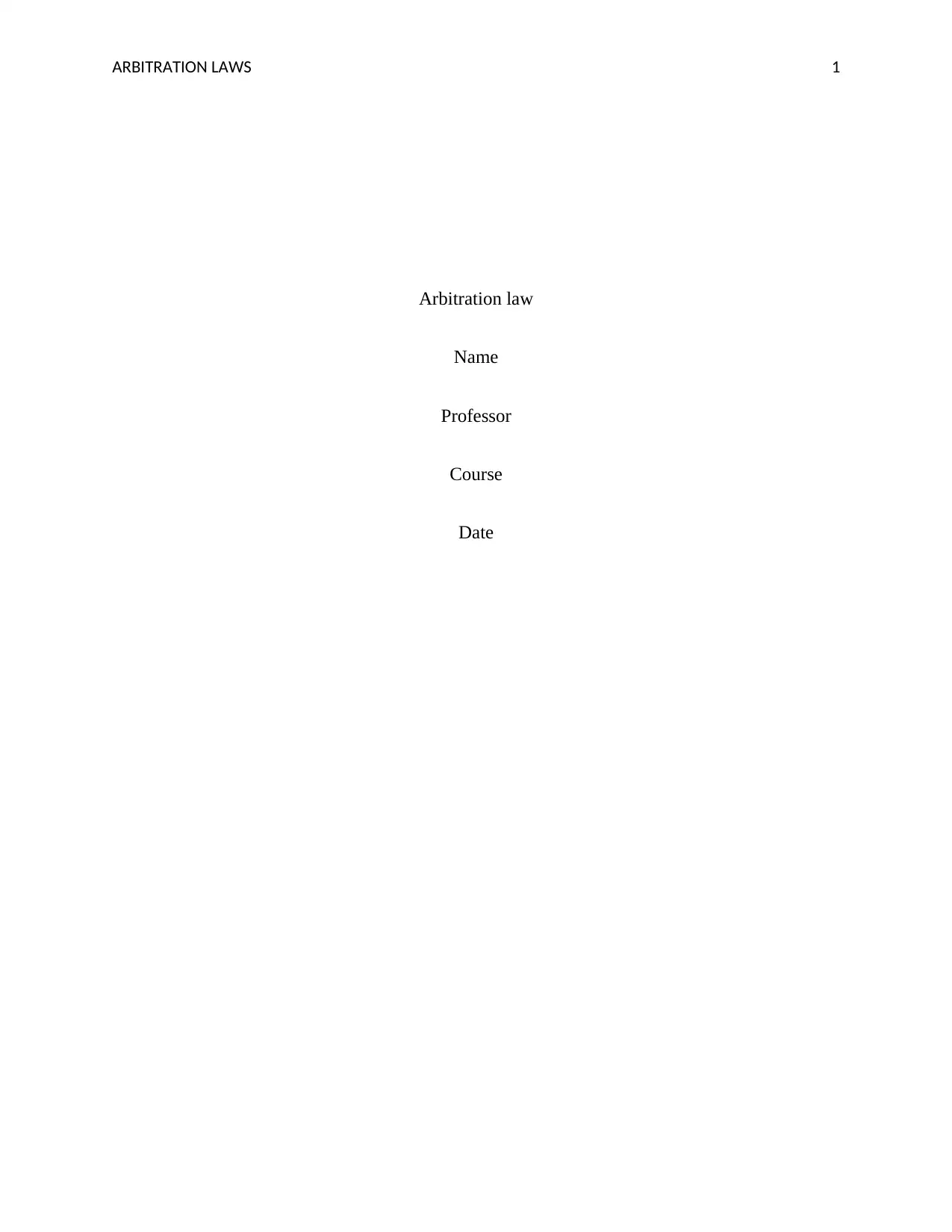
ARBITRATION LAWS 1
Arbitration law
Name
Professor
Course
Date
Arbitration law
Name
Professor
Course
Date
Secure Best Marks with AI Grader
Need help grading? Try our AI Grader for instant feedback on your assignments.
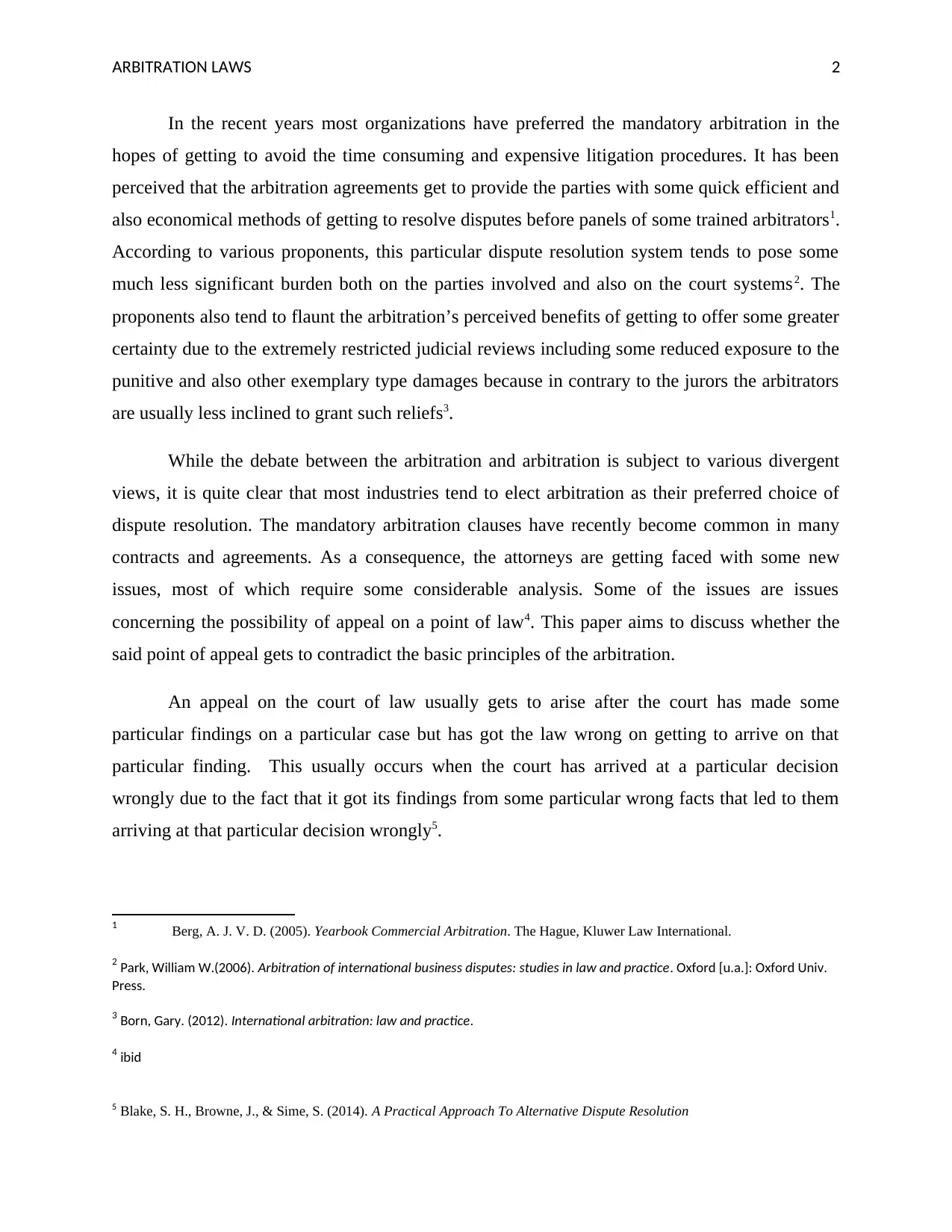
ARBITRATION LAWS 2
In the recent years most organizations have preferred the mandatory arbitration in the
hopes of getting to avoid the time consuming and expensive litigation procedures. It has been
perceived that the arbitration agreements get to provide the parties with some quick efficient and
also economical methods of getting to resolve disputes before panels of some trained arbitrators1.
According to various proponents, this particular dispute resolution system tends to pose some
much less significant burden both on the parties involved and also on the court systems2. The
proponents also tend to flaunt the arbitration’s perceived benefits of getting to offer some greater
certainty due to the extremely restricted judicial reviews including some reduced exposure to the
punitive and also other exemplary type damages because in contrary to the jurors the arbitrators
are usually less inclined to grant such reliefs3.
While the debate between the arbitration and arbitration is subject to various divergent
views, it is quite clear that most industries tend to elect arbitration as their preferred choice of
dispute resolution. The mandatory arbitration clauses have recently become common in many
contracts and agreements. As a consequence, the attorneys are getting faced with some new
issues, most of which require some considerable analysis. Some of the issues are issues
concerning the possibility of appeal on a point of law4. This paper aims to discuss whether the
said point of appeal gets to contradict the basic principles of the arbitration.
An appeal on the court of law usually gets to arise after the court has made some
particular findings on a particular case but has got the law wrong on getting to arrive on that
particular finding. This usually occurs when the court has arrived at a particular decision
wrongly due to the fact that it got its findings from some particular wrong facts that led to them
arriving at that particular decision wrongly5.
1 Berg, A. J. V. D. (2005). Yearbook Commercial Arbitration. The Hague, Kluwer Law International.
2 Park, William W.(2006). Arbitration of international business disputes: studies in law and practice. Oxford [u.a.]: Oxford Univ.
Press.
3 Born, Gary. (2012). International arbitration: law and practice.
4 ibid
5 Blake, S. H., Browne, J., & Sime, S. (2014). A Practical Approach To Alternative Dispute Resolution
In the recent years most organizations have preferred the mandatory arbitration in the
hopes of getting to avoid the time consuming and expensive litigation procedures. It has been
perceived that the arbitration agreements get to provide the parties with some quick efficient and
also economical methods of getting to resolve disputes before panels of some trained arbitrators1.
According to various proponents, this particular dispute resolution system tends to pose some
much less significant burden both on the parties involved and also on the court systems2. The
proponents also tend to flaunt the arbitration’s perceived benefits of getting to offer some greater
certainty due to the extremely restricted judicial reviews including some reduced exposure to the
punitive and also other exemplary type damages because in contrary to the jurors the arbitrators
are usually less inclined to grant such reliefs3.
While the debate between the arbitration and arbitration is subject to various divergent
views, it is quite clear that most industries tend to elect arbitration as their preferred choice of
dispute resolution. The mandatory arbitration clauses have recently become common in many
contracts and agreements. As a consequence, the attorneys are getting faced with some new
issues, most of which require some considerable analysis. Some of the issues are issues
concerning the possibility of appeal on a point of law4. This paper aims to discuss whether the
said point of appeal gets to contradict the basic principles of the arbitration.
An appeal on the court of law usually gets to arise after the court has made some
particular findings on a particular case but has got the law wrong on getting to arrive on that
particular finding. This usually occurs when the court has arrived at a particular decision
wrongly due to the fact that it got its findings from some particular wrong facts that led to them
arriving at that particular decision wrongly5.
1 Berg, A. J. V. D. (2005). Yearbook Commercial Arbitration. The Hague, Kluwer Law International.
2 Park, William W.(2006). Arbitration of international business disputes: studies in law and practice. Oxford [u.a.]: Oxford Univ.
Press.
3 Born, Gary. (2012). International arbitration: law and practice.
4 ibid
5 Blake, S. H., Browne, J., & Sime, S. (2014). A Practical Approach To Alternative Dispute Resolution
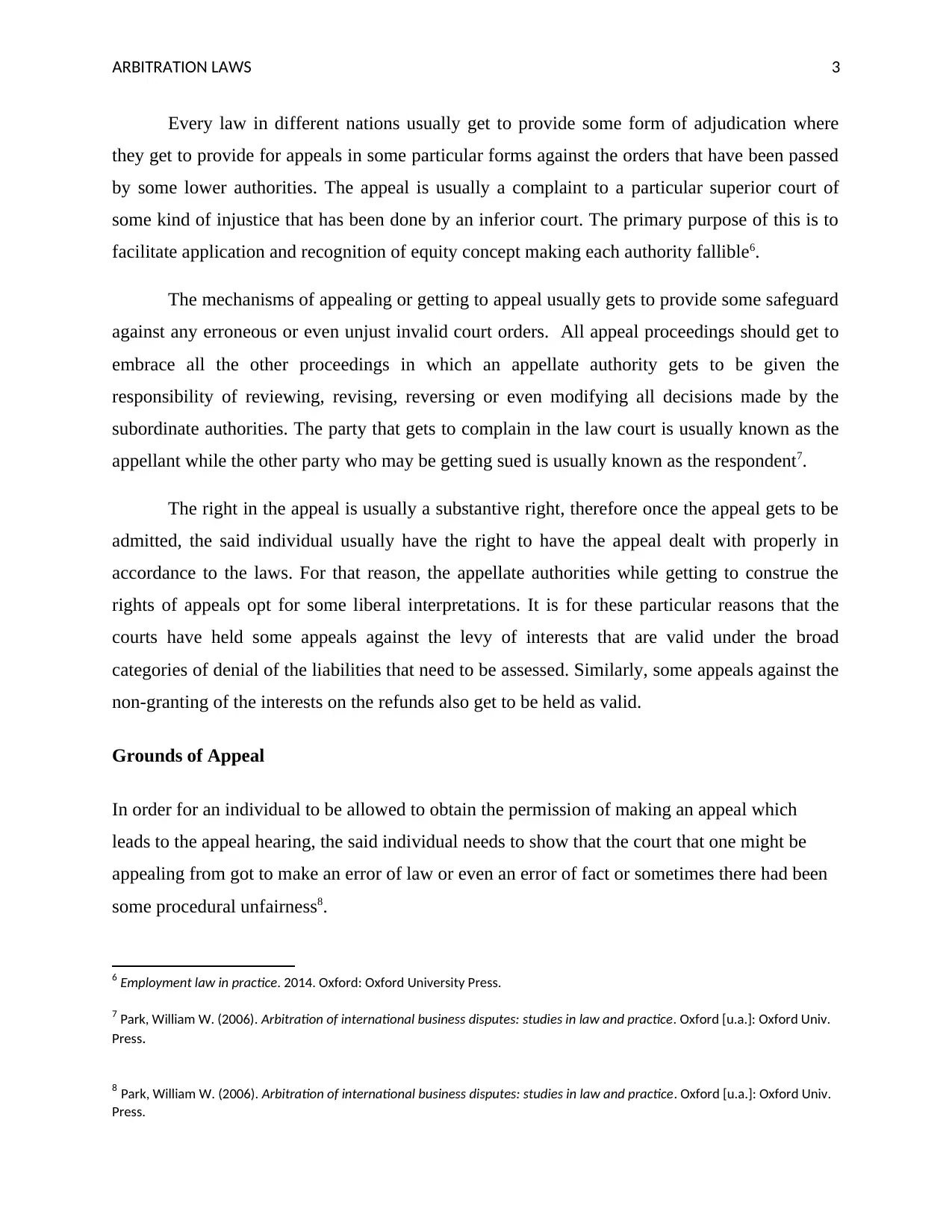
ARBITRATION LAWS 3
Every law in different nations usually get to provide some form of adjudication where
they get to provide for appeals in some particular forms against the orders that have been passed
by some lower authorities. The appeal is usually a complaint to a particular superior court of
some kind of injustice that has been done by an inferior court. The primary purpose of this is to
facilitate application and recognition of equity concept making each authority fallible6.
The mechanisms of appealing or getting to appeal usually gets to provide some safeguard
against any erroneous or even unjust invalid court orders. All appeal proceedings should get to
embrace all the other proceedings in which an appellate authority gets to be given the
responsibility of reviewing, revising, reversing or even modifying all decisions made by the
subordinate authorities. The party that gets to complain in the law court is usually known as the
appellant while the other party who may be getting sued is usually known as the respondent7.
The right in the appeal is usually a substantive right, therefore once the appeal gets to be
admitted, the said individual usually have the right to have the appeal dealt with properly in
accordance to the laws. For that reason, the appellate authorities while getting to construe the
rights of appeals opt for some liberal interpretations. It is for these particular reasons that the
courts have held some appeals against the levy of interests that are valid under the broad
categories of denial of the liabilities that need to be assessed. Similarly, some appeals against the
non-granting of the interests on the refunds also get to be held as valid.
Grounds of Appeal
In order for an individual to be allowed to obtain the permission of making an appeal which
leads to the appeal hearing, the said individual needs to show that the court that one might be
appealing from got to make an error of law or even an error of fact or sometimes there had been
some procedural unfairness8.
6 Employment law in practice. 2014. Oxford: Oxford University Press.
7 Park, William W. (2006). Arbitration of international business disputes: studies in law and practice. Oxford [u.a.]: Oxford Univ.
Press.
8 Park, William W. (2006). Arbitration of international business disputes: studies in law and practice. Oxford [u.a.]: Oxford Univ.
Press.
Every law in different nations usually get to provide some form of adjudication where
they get to provide for appeals in some particular forms against the orders that have been passed
by some lower authorities. The appeal is usually a complaint to a particular superior court of
some kind of injustice that has been done by an inferior court. The primary purpose of this is to
facilitate application and recognition of equity concept making each authority fallible6.
The mechanisms of appealing or getting to appeal usually gets to provide some safeguard
against any erroneous or even unjust invalid court orders. All appeal proceedings should get to
embrace all the other proceedings in which an appellate authority gets to be given the
responsibility of reviewing, revising, reversing or even modifying all decisions made by the
subordinate authorities. The party that gets to complain in the law court is usually known as the
appellant while the other party who may be getting sued is usually known as the respondent7.
The right in the appeal is usually a substantive right, therefore once the appeal gets to be
admitted, the said individual usually have the right to have the appeal dealt with properly in
accordance to the laws. For that reason, the appellate authorities while getting to construe the
rights of appeals opt for some liberal interpretations. It is for these particular reasons that the
courts have held some appeals against the levy of interests that are valid under the broad
categories of denial of the liabilities that need to be assessed. Similarly, some appeals against the
non-granting of the interests on the refunds also get to be held as valid.
Grounds of Appeal
In order for an individual to be allowed to obtain the permission of making an appeal which
leads to the appeal hearing, the said individual needs to show that the court that one might be
appealing from got to make an error of law or even an error of fact or sometimes there had been
some procedural unfairness8.
6 Employment law in practice. 2014. Oxford: Oxford University Press.
7 Park, William W. (2006). Arbitration of international business disputes: studies in law and practice. Oxford [u.a.]: Oxford Univ.
Press.
8 Park, William W. (2006). Arbitration of international business disputes: studies in law and practice. Oxford [u.a.]: Oxford Univ.
Press.
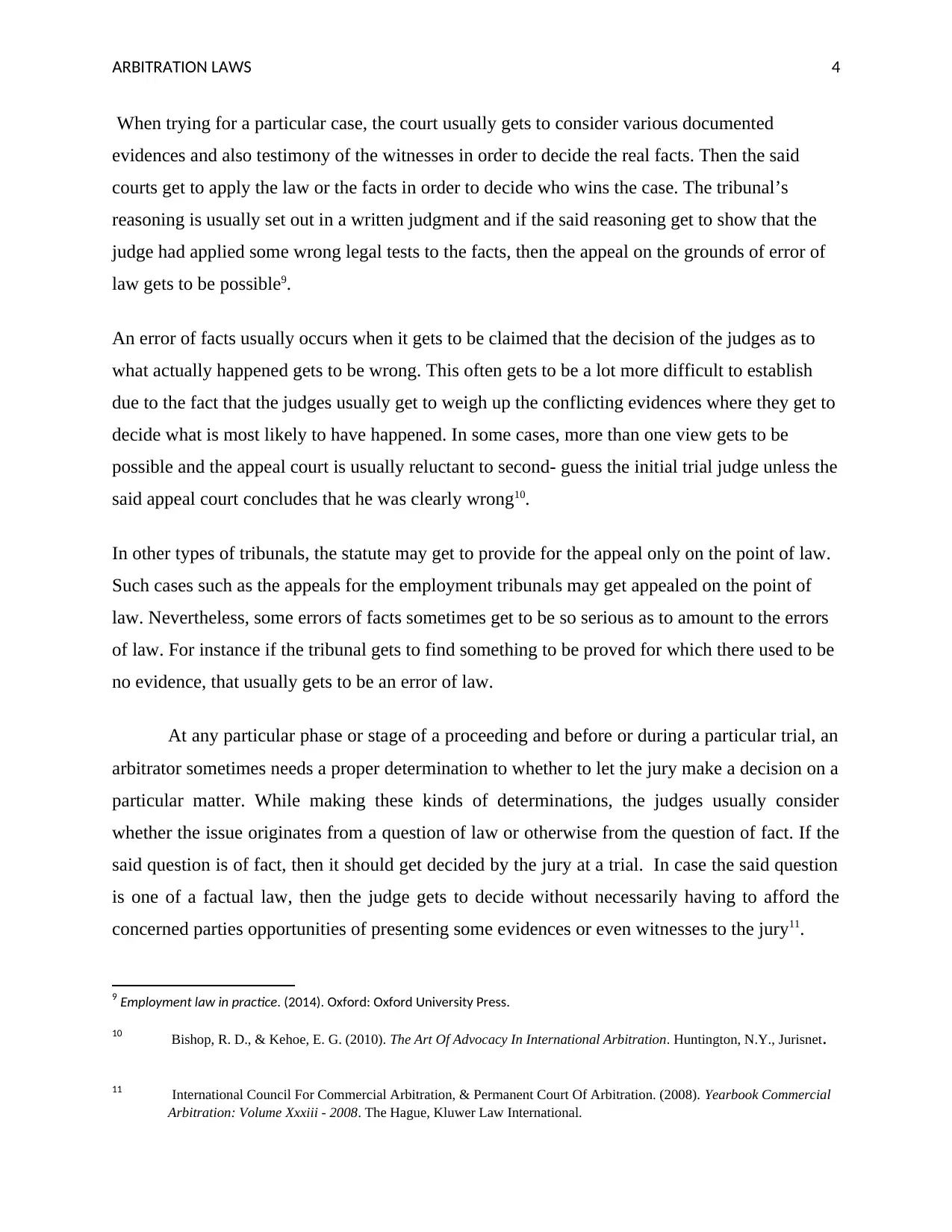
ARBITRATION LAWS 4
When trying for a particular case, the court usually gets to consider various documented
evidences and also testimony of the witnesses in order to decide the real facts. Then the said
courts get to apply the law or the facts in order to decide who wins the case. The tribunal’s
reasoning is usually set out in a written judgment and if the said reasoning get to show that the
judge had applied some wrong legal tests to the facts, then the appeal on the grounds of error of
law gets to be possible9.
An error of facts usually occurs when it gets to be claimed that the decision of the judges as to
what actually happened gets to be wrong. This often gets to be a lot more difficult to establish
due to the fact that the judges usually get to weigh up the conflicting evidences where they get to
decide what is most likely to have happened. In some cases, more than one view gets to be
possible and the appeal court is usually reluctant to second- guess the initial trial judge unless the
said appeal court concludes that he was clearly wrong10.
In other types of tribunals, the statute may get to provide for the appeal only on the point of law.
Such cases such as the appeals for the employment tribunals may get appealed on the point of
law. Nevertheless, some errors of facts sometimes get to be so serious as to amount to the errors
of law. For instance if the tribunal gets to find something to be proved for which there used to be
no evidence, that usually gets to be an error of law.
At any particular phase or stage of a proceeding and before or during a particular trial, an
arbitrator sometimes needs a proper determination to whether to let the jury make a decision on a
particular matter. While making these kinds of determinations, the judges usually consider
whether the issue originates from a question of law or otherwise from the question of fact. If the
said question is of fact, then it should get decided by the jury at a trial. In case the said question
is one of a factual law, then the judge gets to decide without necessarily having to afford the
concerned parties opportunities of presenting some evidences or even witnesses to the jury11.
9 Employment law in practice. (2014). Oxford: Oxford University Press.
10 Bishop, R. D., & Kehoe, E. G. (2010). The Art Of Advocacy In International Arbitration. Huntington, N.Y., Jurisnet.
11 International Council For Commercial Arbitration, & Permanent Court Of Arbitration. (2008). Yearbook Commercial
Arbitration: Volume Xxxiii - 2008. The Hague, Kluwer Law International.
When trying for a particular case, the court usually gets to consider various documented
evidences and also testimony of the witnesses in order to decide the real facts. Then the said
courts get to apply the law or the facts in order to decide who wins the case. The tribunal’s
reasoning is usually set out in a written judgment and if the said reasoning get to show that the
judge had applied some wrong legal tests to the facts, then the appeal on the grounds of error of
law gets to be possible9.
An error of facts usually occurs when it gets to be claimed that the decision of the judges as to
what actually happened gets to be wrong. This often gets to be a lot more difficult to establish
due to the fact that the judges usually get to weigh up the conflicting evidences where they get to
decide what is most likely to have happened. In some cases, more than one view gets to be
possible and the appeal court is usually reluctant to second- guess the initial trial judge unless the
said appeal court concludes that he was clearly wrong10.
In other types of tribunals, the statute may get to provide for the appeal only on the point of law.
Such cases such as the appeals for the employment tribunals may get appealed on the point of
law. Nevertheless, some errors of facts sometimes get to be so serious as to amount to the errors
of law. For instance if the tribunal gets to find something to be proved for which there used to be
no evidence, that usually gets to be an error of law.
At any particular phase or stage of a proceeding and before or during a particular trial, an
arbitrator sometimes needs a proper determination to whether to let the jury make a decision on a
particular matter. While making these kinds of determinations, the judges usually consider
whether the issue originates from a question of law or otherwise from the question of fact. If the
said question is of fact, then it should get decided by the jury at a trial. In case the said question
is one of a factual law, then the judge gets to decide without necessarily having to afford the
concerned parties opportunities of presenting some evidences or even witnesses to the jury11.
9 Employment law in practice. (2014). Oxford: Oxford University Press.
10 Bishop, R. D., & Kehoe, E. G. (2010). The Art Of Advocacy In International Arbitration. Huntington, N.Y., Jurisnet.
11 International Council For Commercial Arbitration, & Permanent Court Of Arbitration. (2008). Yearbook Commercial
Arbitration: Volume Xxxiii - 2008. The Hague, Kluwer Law International.
Secure Best Marks with AI Grader
Need help grading? Try our AI Grader for instant feedback on your assignments.
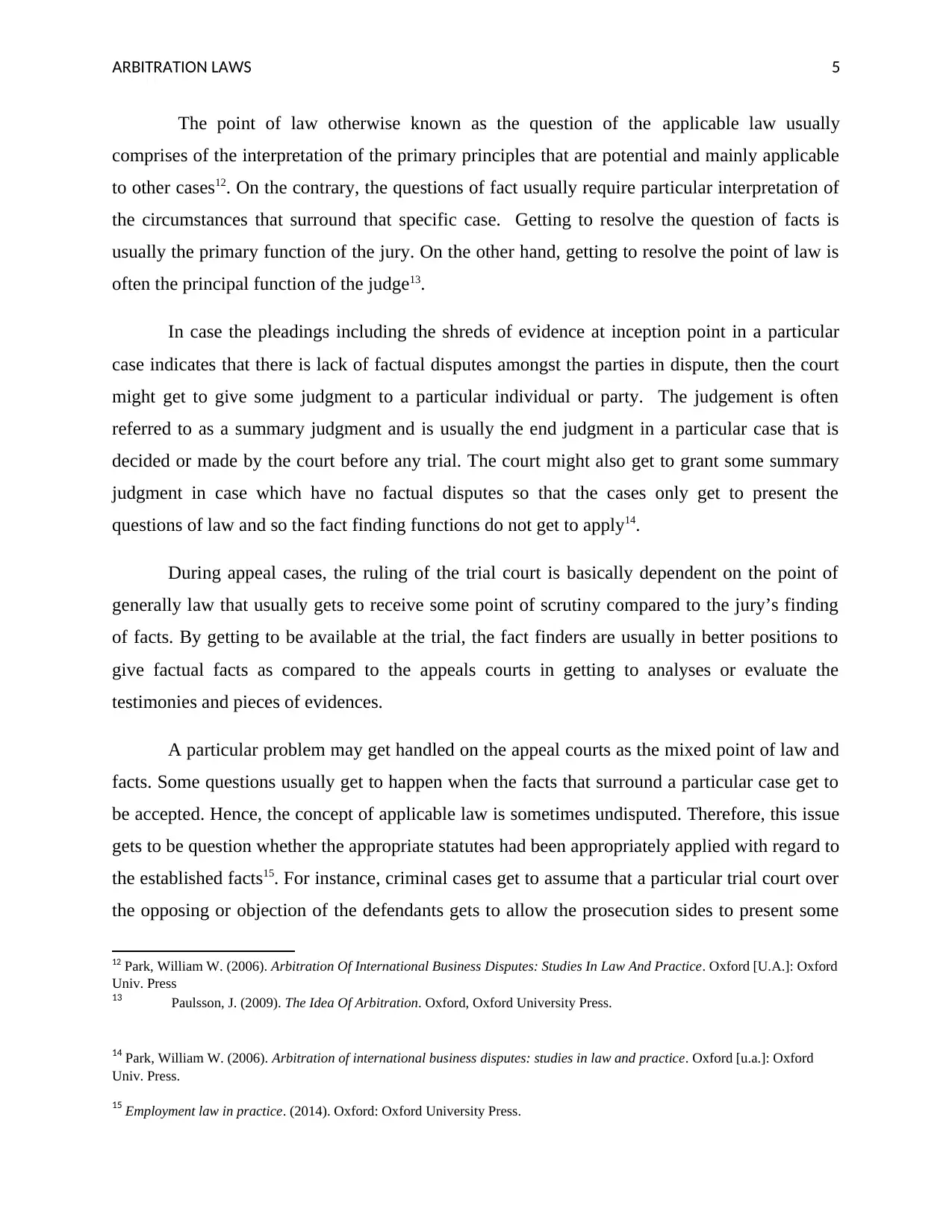
ARBITRATION LAWS 5
The point of law otherwise known as the question of the applicable law usually
comprises of the interpretation of the primary principles that are potential and mainly applicable
to other cases12. On the contrary, the questions of fact usually require particular interpretation of
the circumstances that surround that specific case. Getting to resolve the question of facts is
usually the primary function of the jury. On the other hand, getting to resolve the point of law is
often the principal function of the judge13.
In case the pleadings including the shreds of evidence at inception point in a particular
case indicates that there is lack of factual disputes amongst the parties in dispute, then the court
might get to give some judgment to a particular individual or party. The judgement is often
referred to as a summary judgment and is usually the end judgment in a particular case that is
decided or made by the court before any trial. The court might also get to grant some summary
judgment in case which have no factual disputes so that the cases only get to present the
questions of law and so the fact finding functions do not get to apply14.
During appeal cases, the ruling of the trial court is basically dependent on the point of
generally law that usually gets to receive some point of scrutiny compared to the jury’s finding
of facts. By getting to be available at the trial, the fact finders are usually in better positions to
give factual facts as compared to the appeals courts in getting to analyses or evaluate the
testimonies and pieces of evidences.
A particular problem may get handled on the appeal courts as the mixed point of law and
facts. Some questions usually get to happen when the facts that surround a particular case get to
be accepted. Hence, the concept of applicable law is sometimes undisputed. Therefore, this issue
gets to be question whether the appropriate statutes had been appropriately applied with regard to
the established facts15. For instance, criminal cases get to assume that a particular trial court over
the opposing or objection of the defendants gets to allow the prosecution sides to present some
12 Park, William W. (2006). Arbitration Of International Business Disputes: Studies In Law And Practice. Oxford [U.A.]: Oxford
Univ. Press
13 Paulsson, J. (2009). The Idea Of Arbitration. Oxford, Oxford University Press.
14 Park, William W. (2006). Arbitration of international business disputes: studies in law and practice. Oxford [u.a.]: Oxford
Univ. Press.
15 Employment law in practice. (2014). Oxford: Oxford University Press.
The point of law otherwise known as the question of the applicable law usually
comprises of the interpretation of the primary principles that are potential and mainly applicable
to other cases12. On the contrary, the questions of fact usually require particular interpretation of
the circumstances that surround that specific case. Getting to resolve the question of facts is
usually the primary function of the jury. On the other hand, getting to resolve the point of law is
often the principal function of the judge13.
In case the pleadings including the shreds of evidence at inception point in a particular
case indicates that there is lack of factual disputes amongst the parties in dispute, then the court
might get to give some judgment to a particular individual or party. The judgement is often
referred to as a summary judgment and is usually the end judgment in a particular case that is
decided or made by the court before any trial. The court might also get to grant some summary
judgment in case which have no factual disputes so that the cases only get to present the
questions of law and so the fact finding functions do not get to apply14.
During appeal cases, the ruling of the trial court is basically dependent on the point of
generally law that usually gets to receive some point of scrutiny compared to the jury’s finding
of facts. By getting to be available at the trial, the fact finders are usually in better positions to
give factual facts as compared to the appeals courts in getting to analyses or evaluate the
testimonies and pieces of evidences.
A particular problem may get handled on the appeal courts as the mixed point of law and
facts. Some questions usually get to happen when the facts that surround a particular case get to
be accepted. Hence, the concept of applicable law is sometimes undisputed. Therefore, this issue
gets to be question whether the appropriate statutes had been appropriately applied with regard to
the established facts15. For instance, criminal cases get to assume that a particular trial court over
the opposing or objection of the defendants gets to allow the prosecution sides to present some
12 Park, William W. (2006). Arbitration Of International Business Disputes: Studies In Law And Practice. Oxford [U.A.]: Oxford
Univ. Press
13 Paulsson, J. (2009). The Idea Of Arbitration. Oxford, Oxford University Press.
14 Park, William W. (2006). Arbitration of international business disputes: studies in law and practice. Oxford [u.a.]: Oxford
Univ. Press.
15 Employment law in practice. (2014). Oxford: Oxford University Press.
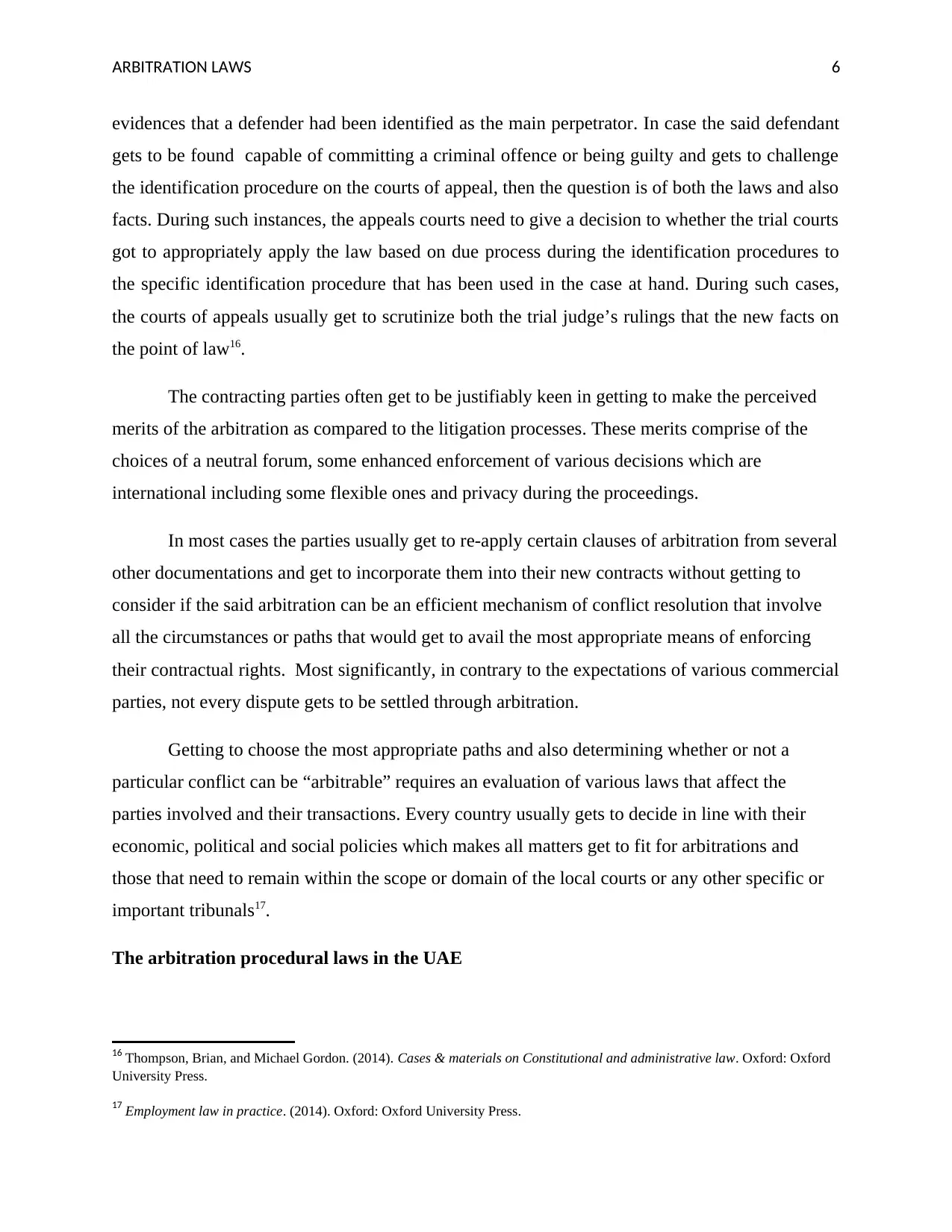
ARBITRATION LAWS 6
evidences that a defender had been identified as the main perpetrator. In case the said defendant
gets to be found capable of committing a criminal offence or being guilty and gets to challenge
the identification procedure on the courts of appeal, then the question is of both the laws and also
facts. During such instances, the appeals courts need to give a decision to whether the trial courts
got to appropriately apply the law based on due process during the identification procedures to
the specific identification procedure that has been used in the case at hand. During such cases,
the courts of appeals usually get to scrutinize both the trial judge’s rulings that the new facts on
the point of law16.
The contracting parties often get to be justifiably keen in getting to make the perceived
merits of the arbitration as compared to the litigation processes. These merits comprise of the
choices of a neutral forum, some enhanced enforcement of various decisions which are
international including some flexible ones and privacy during the proceedings.
In most cases the parties usually get to re-apply certain clauses of arbitration from several
other documentations and get to incorporate them into their new contracts without getting to
consider if the said arbitration can be an efficient mechanism of conflict resolution that involve
all the circumstances or paths that would get to avail the most appropriate means of enforcing
their contractual rights. Most significantly, in contrary to the expectations of various commercial
parties, not every dispute gets to be settled through arbitration.
Getting to choose the most appropriate paths and also determining whether or not a
particular conflict can be “arbitrable” requires an evaluation of various laws that affect the
parties involved and their transactions. Every country usually gets to decide in line with their
economic, political and social policies which makes all matters get to fit for arbitrations and
those that need to remain within the scope or domain of the local courts or any other specific or
important tribunals17.
The arbitration procedural laws in the UAE
16 Thompson, Brian, and Michael Gordon. (2014). Cases & materials on Constitutional and administrative law. Oxford: Oxford
University Press.
17 Employment law in practice. (2014). Oxford: Oxford University Press.
evidences that a defender had been identified as the main perpetrator. In case the said defendant
gets to be found capable of committing a criminal offence or being guilty and gets to challenge
the identification procedure on the courts of appeal, then the question is of both the laws and also
facts. During such instances, the appeals courts need to give a decision to whether the trial courts
got to appropriately apply the law based on due process during the identification procedures to
the specific identification procedure that has been used in the case at hand. During such cases,
the courts of appeals usually get to scrutinize both the trial judge’s rulings that the new facts on
the point of law16.
The contracting parties often get to be justifiably keen in getting to make the perceived
merits of the arbitration as compared to the litigation processes. These merits comprise of the
choices of a neutral forum, some enhanced enforcement of various decisions which are
international including some flexible ones and privacy during the proceedings.
In most cases the parties usually get to re-apply certain clauses of arbitration from several
other documentations and get to incorporate them into their new contracts without getting to
consider if the said arbitration can be an efficient mechanism of conflict resolution that involve
all the circumstances or paths that would get to avail the most appropriate means of enforcing
their contractual rights. Most significantly, in contrary to the expectations of various commercial
parties, not every dispute gets to be settled through arbitration.
Getting to choose the most appropriate paths and also determining whether or not a
particular conflict can be “arbitrable” requires an evaluation of various laws that affect the
parties involved and their transactions. Every country usually gets to decide in line with their
economic, political and social policies which makes all matters get to fit for arbitrations and
those that need to remain within the scope or domain of the local courts or any other specific or
important tribunals17.
The arbitration procedural laws in the UAE
16 Thompson, Brian, and Michael Gordon. (2014). Cases & materials on Constitutional and administrative law. Oxford: Oxford
University Press.
17 Employment law in practice. (2014). Oxford: Oxford University Press.
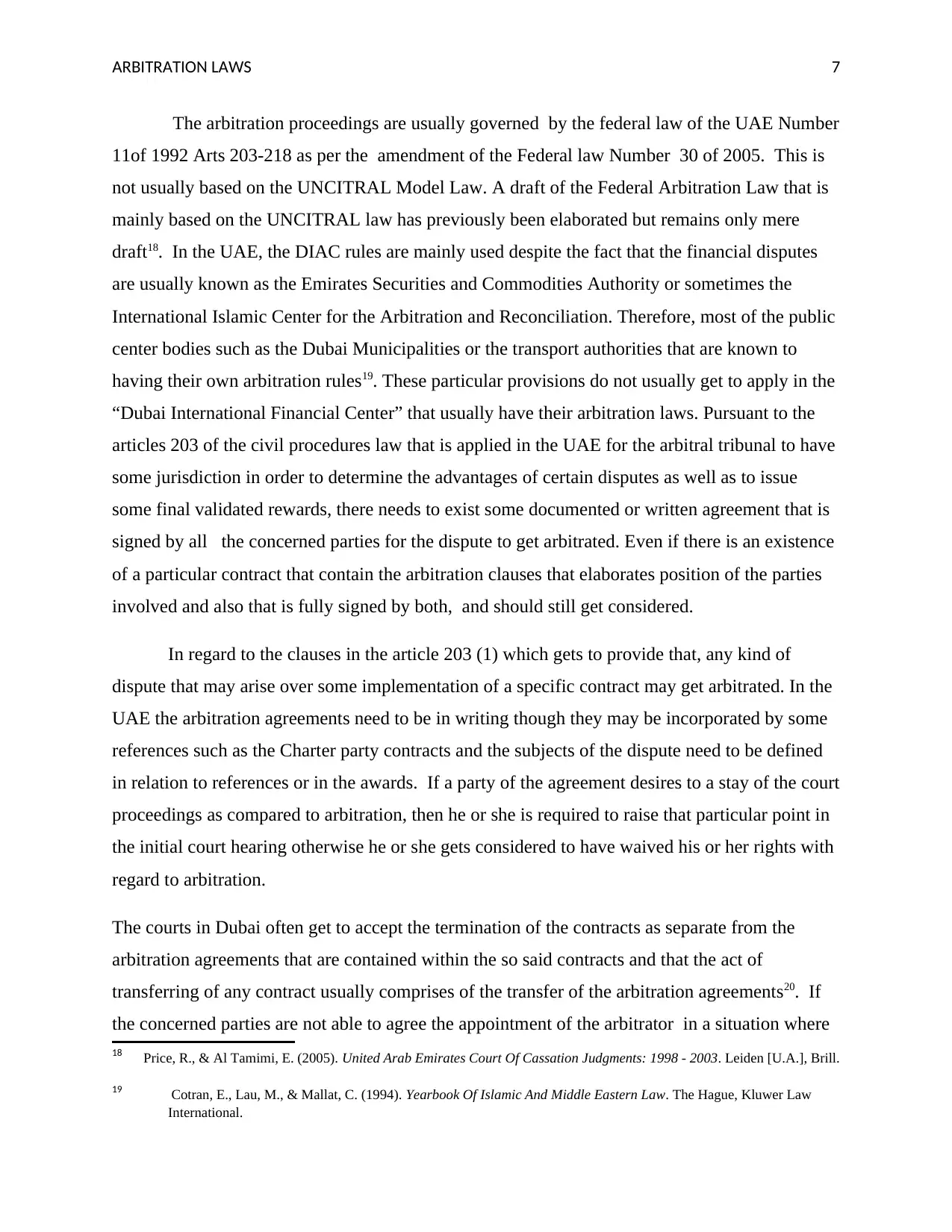
ARBITRATION LAWS 7
The arbitration proceedings are usually governed by the federal law of the UAE Number
11of 1992 Arts 203-218 as per the amendment of the Federal law Number 30 of 2005. This is
not usually based on the UNCITRAL Model Law. A draft of the Federal Arbitration Law that is
mainly based on the UNCITRAL law has previously been elaborated but remains only mere
draft18. In the UAE, the DIAC rules are mainly used despite the fact that the financial disputes
are usually known as the Emirates Securities and Commodities Authority or sometimes the
International Islamic Center for the Arbitration and Reconciliation. Therefore, most of the public
center bodies such as the Dubai Municipalities or the transport authorities that are known to
having their own arbitration rules19. These particular provisions do not usually get to apply in the
“Dubai International Financial Center” that usually have their arbitration laws. Pursuant to the
articles 203 of the civil procedures law that is applied in the UAE for the arbitral tribunal to have
some jurisdiction in order to determine the advantages of certain disputes as well as to issue
some final validated rewards, there needs to exist some documented or written agreement that is
signed by all the concerned parties for the dispute to get arbitrated. Even if there is an existence
of a particular contract that contain the arbitration clauses that elaborates position of the parties
involved and also that is fully signed by both, and should still get considered.
In regard to the clauses in the article 203 (1) which gets to provide that, any kind of
dispute that may arise over some implementation of a specific contract may get arbitrated. In the
UAE the arbitration agreements need to be in writing though they may be incorporated by some
references such as the Charter party contracts and the subjects of the dispute need to be defined
in relation to references or in the awards. If a party of the agreement desires to a stay of the court
proceedings as compared to arbitration, then he or she is required to raise that particular point in
the initial court hearing otherwise he or she gets considered to have waived his or her rights with
regard to arbitration.
The courts in Dubai often get to accept the termination of the contracts as separate from the
arbitration agreements that are contained within the so said contracts and that the act of
transferring of any contract usually comprises of the transfer of the arbitration agreements20. If
the concerned parties are not able to agree the appointment of the arbitrator in a situation where
18 Price, R., & Al Tamimi, E. (2005). United Arab Emirates Court Of Cassation Judgments: 1998 - 2003. Leiden [U.A.], Brill.
19 Cotran, E., Lau, M., & Mallat, C. (1994). Yearbook Of Islamic And Middle Eastern Law. The Hague, Kluwer Law
International.
The arbitration proceedings are usually governed by the federal law of the UAE Number
11of 1992 Arts 203-218 as per the amendment of the Federal law Number 30 of 2005. This is
not usually based on the UNCITRAL Model Law. A draft of the Federal Arbitration Law that is
mainly based on the UNCITRAL law has previously been elaborated but remains only mere
draft18. In the UAE, the DIAC rules are mainly used despite the fact that the financial disputes
are usually known as the Emirates Securities and Commodities Authority or sometimes the
International Islamic Center for the Arbitration and Reconciliation. Therefore, most of the public
center bodies such as the Dubai Municipalities or the transport authorities that are known to
having their own arbitration rules19. These particular provisions do not usually get to apply in the
“Dubai International Financial Center” that usually have their arbitration laws. Pursuant to the
articles 203 of the civil procedures law that is applied in the UAE for the arbitral tribunal to have
some jurisdiction in order to determine the advantages of certain disputes as well as to issue
some final validated rewards, there needs to exist some documented or written agreement that is
signed by all the concerned parties for the dispute to get arbitrated. Even if there is an existence
of a particular contract that contain the arbitration clauses that elaborates position of the parties
involved and also that is fully signed by both, and should still get considered.
In regard to the clauses in the article 203 (1) which gets to provide that, any kind of
dispute that may arise over some implementation of a specific contract may get arbitrated. In the
UAE the arbitration agreements need to be in writing though they may be incorporated by some
references such as the Charter party contracts and the subjects of the dispute need to be defined
in relation to references or in the awards. If a party of the agreement desires to a stay of the court
proceedings as compared to arbitration, then he or she is required to raise that particular point in
the initial court hearing otherwise he or she gets considered to have waived his or her rights with
regard to arbitration.
The courts in Dubai often get to accept the termination of the contracts as separate from the
arbitration agreements that are contained within the so said contracts and that the act of
transferring of any contract usually comprises of the transfer of the arbitration agreements20. If
the concerned parties are not able to agree the appointment of the arbitrator in a situation where
18 Price, R., & Al Tamimi, E. (2005). United Arab Emirates Court Of Cassation Judgments: 1998 - 2003. Leiden [U.A.], Brill.
19 Cotran, E., Lau, M., & Mallat, C. (1994). Yearbook Of Islamic And Middle Eastern Law. The Hague, Kluwer Law
International.
Paraphrase This Document
Need a fresh take? Get an instant paraphrase of this document with our AI Paraphraser
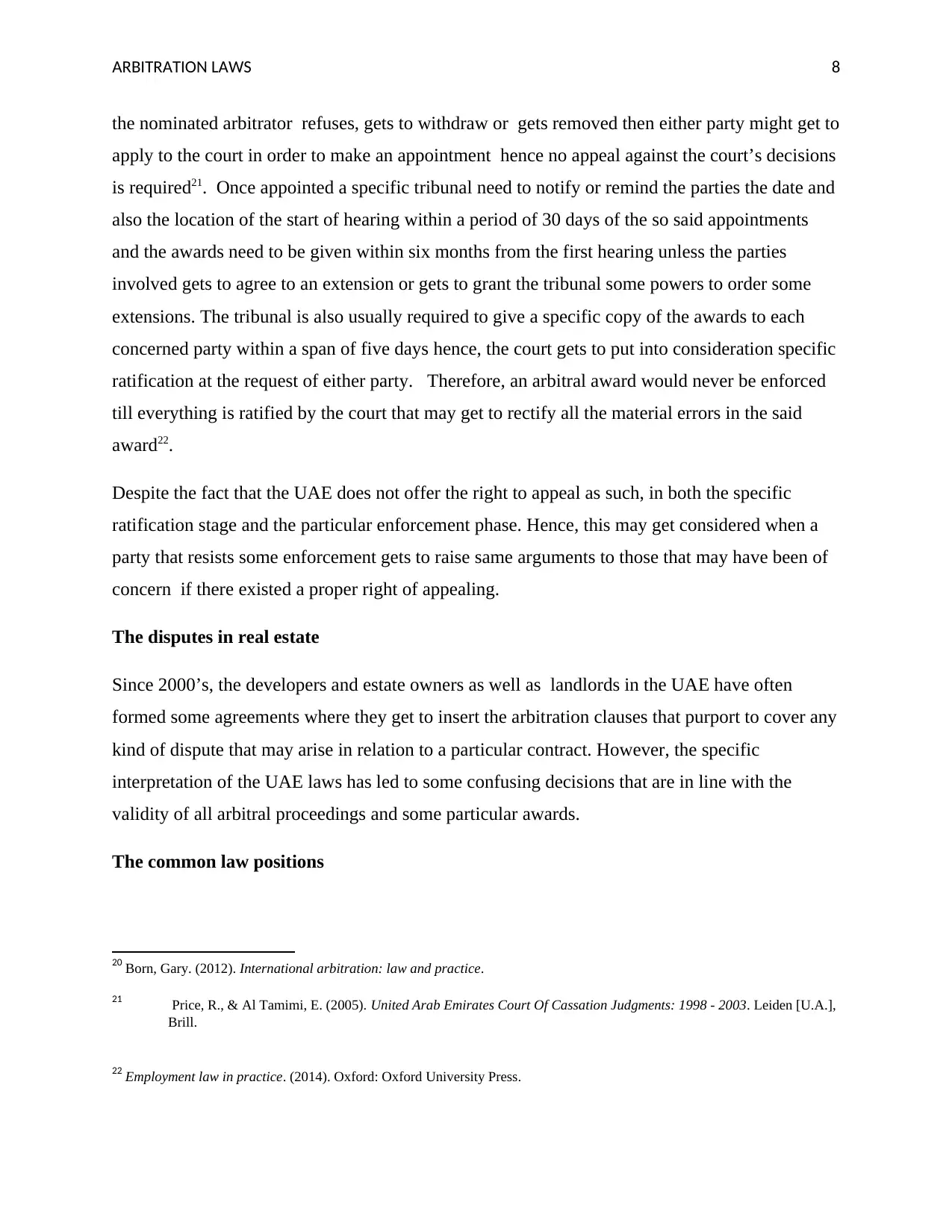
ARBITRATION LAWS 8
the nominated arbitrator refuses, gets to withdraw or gets removed then either party might get to
apply to the court in order to make an appointment hence no appeal against the court’s decisions
is required21. Once appointed a specific tribunal need to notify or remind the parties the date and
also the location of the start of hearing within a period of 30 days of the so said appointments
and the awards need to be given within six months from the first hearing unless the parties
involved gets to agree to an extension or gets to grant the tribunal some powers to order some
extensions. The tribunal is also usually required to give a specific copy of the awards to each
concerned party within a span of five days hence, the court gets to put into consideration specific
ratification at the request of either party. Therefore, an arbitral award would never be enforced
till everything is ratified by the court that may get to rectify all the material errors in the said
award22.
Despite the fact that the UAE does not offer the right to appeal as such, in both the specific
ratification stage and the particular enforcement phase. Hence, this may get considered when a
party that resists some enforcement gets to raise same arguments to those that may have been of
concern if there existed a proper right of appealing.
The disputes in real estate
Since 2000’s, the developers and estate owners as well as landlords in the UAE have often
formed some agreements where they get to insert the arbitration clauses that purport to cover any
kind of dispute that may arise in relation to a particular contract. However, the specific
interpretation of the UAE laws has led to some confusing decisions that are in line with the
validity of all arbitral proceedings and some particular awards.
The common law positions
20 Born, Gary. (2012). International arbitration: law and practice.
21 Price, R., & Al Tamimi, E. (2005). United Arab Emirates Court Of Cassation Judgments: 1998 - 2003. Leiden [U.A.],
Brill.
22 Employment law in practice. (2014). Oxford: Oxford University Press.
the nominated arbitrator refuses, gets to withdraw or gets removed then either party might get to
apply to the court in order to make an appointment hence no appeal against the court’s decisions
is required21. Once appointed a specific tribunal need to notify or remind the parties the date and
also the location of the start of hearing within a period of 30 days of the so said appointments
and the awards need to be given within six months from the first hearing unless the parties
involved gets to agree to an extension or gets to grant the tribunal some powers to order some
extensions. The tribunal is also usually required to give a specific copy of the awards to each
concerned party within a span of five days hence, the court gets to put into consideration specific
ratification at the request of either party. Therefore, an arbitral award would never be enforced
till everything is ratified by the court that may get to rectify all the material errors in the said
award22.
Despite the fact that the UAE does not offer the right to appeal as such, in both the specific
ratification stage and the particular enforcement phase. Hence, this may get considered when a
party that resists some enforcement gets to raise same arguments to those that may have been of
concern if there existed a proper right of appealing.
The disputes in real estate
Since 2000’s, the developers and estate owners as well as landlords in the UAE have often
formed some agreements where they get to insert the arbitration clauses that purport to cover any
kind of dispute that may arise in relation to a particular contract. However, the specific
interpretation of the UAE laws has led to some confusing decisions that are in line with the
validity of all arbitral proceedings and some particular awards.
The common law positions
20 Born, Gary. (2012). International arbitration: law and practice.
21 Price, R., & Al Tamimi, E. (2005). United Arab Emirates Court Of Cassation Judgments: 1998 - 2003. Leiden [U.A.],
Brill.
22 Employment law in practice. (2014). Oxford: Oxford University Press.
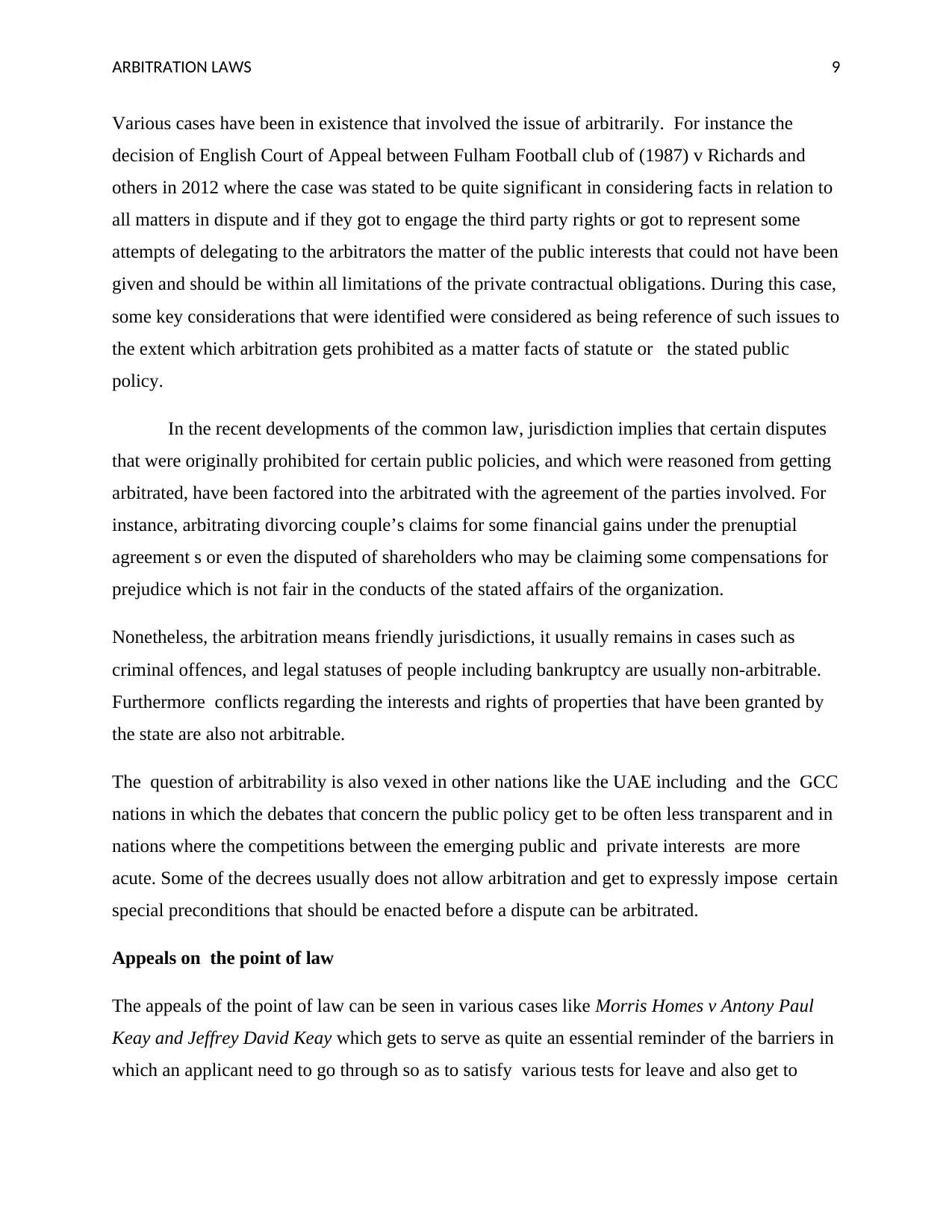
ARBITRATION LAWS 9
Various cases have been in existence that involved the issue of arbitrarily. For instance the
decision of English Court of Appeal between Fulham Football club of (1987) v Richards and
others in 2012 where the case was stated to be quite significant in considering facts in relation to
all matters in dispute and if they got to engage the third party rights or got to represent some
attempts of delegating to the arbitrators the matter of the public interests that could not have been
given and should be within all limitations of the private contractual obligations. During this case,
some key considerations that were identified were considered as being reference of such issues to
the extent which arbitration gets prohibited as a matter facts of statute or the stated public
policy.
In the recent developments of the common law, jurisdiction implies that certain disputes
that were originally prohibited for certain public policies, and which were reasoned from getting
arbitrated, have been factored into the arbitrated with the agreement of the parties involved. For
instance, arbitrating divorcing couple’s claims for some financial gains under the prenuptial
agreement s or even the disputed of shareholders who may be claiming some compensations for
prejudice which is not fair in the conducts of the stated affairs of the organization.
Nonetheless, the arbitration means friendly jurisdictions, it usually remains in cases such as
criminal offences, and legal statuses of people including bankruptcy are usually non-arbitrable.
Furthermore conflicts regarding the interests and rights of properties that have been granted by
the state are also not arbitrable.
The question of arbitrability is also vexed in other nations like the UAE including and the GCC
nations in which the debates that concern the public policy get to be often less transparent and in
nations where the competitions between the emerging public and private interests are more
acute. Some of the decrees usually does not allow arbitration and get to expressly impose certain
special preconditions that should be enacted before a dispute can be arbitrated.
Appeals on the point of law
The appeals of the point of law can be seen in various cases like Morris Homes v Antony Paul
Keay and Jeffrey David Keay which gets to serve as quite an essential reminder of the barriers in
which an applicant need to go through so as to satisfy various tests for leave and also get to
Various cases have been in existence that involved the issue of arbitrarily. For instance the
decision of English Court of Appeal between Fulham Football club of (1987) v Richards and
others in 2012 where the case was stated to be quite significant in considering facts in relation to
all matters in dispute and if they got to engage the third party rights or got to represent some
attempts of delegating to the arbitrators the matter of the public interests that could not have been
given and should be within all limitations of the private contractual obligations. During this case,
some key considerations that were identified were considered as being reference of such issues to
the extent which arbitration gets prohibited as a matter facts of statute or the stated public
policy.
In the recent developments of the common law, jurisdiction implies that certain disputes
that were originally prohibited for certain public policies, and which were reasoned from getting
arbitrated, have been factored into the arbitrated with the agreement of the parties involved. For
instance, arbitrating divorcing couple’s claims for some financial gains under the prenuptial
agreement s or even the disputed of shareholders who may be claiming some compensations for
prejudice which is not fair in the conducts of the stated affairs of the organization.
Nonetheless, the arbitration means friendly jurisdictions, it usually remains in cases such as
criminal offences, and legal statuses of people including bankruptcy are usually non-arbitrable.
Furthermore conflicts regarding the interests and rights of properties that have been granted by
the state are also not arbitrable.
The question of arbitrability is also vexed in other nations like the UAE including and the GCC
nations in which the debates that concern the public policy get to be often less transparent and in
nations where the competitions between the emerging public and private interests are more
acute. Some of the decrees usually does not allow arbitration and get to expressly impose certain
special preconditions that should be enacted before a dispute can be arbitrated.
Appeals on the point of law
The appeals of the point of law can be seen in various cases like Morris Homes v Antony Paul
Keay and Jeffrey David Keay which gets to serve as quite an essential reminder of the barriers in
which an applicant need to go through so as to satisfy various tests for leave and also get to
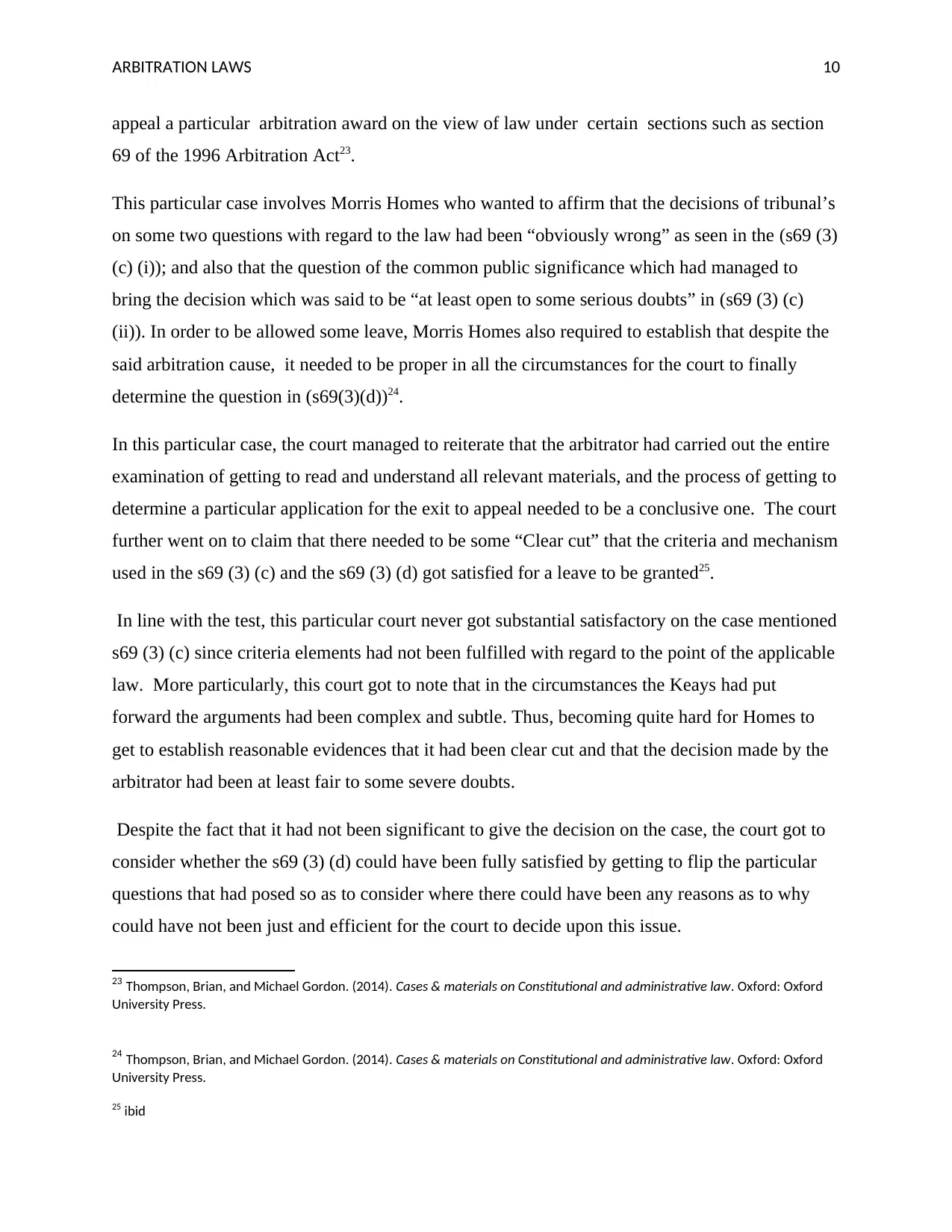
ARBITRATION LAWS 10
appeal a particular arbitration award on the view of law under certain sections such as section
69 of the 1996 Arbitration Act23.
This particular case involves Morris Homes who wanted to affirm that the decisions of tribunal’s
on some two questions with regard to the law had been “obviously wrong” as seen in the (s69 (3)
(c) (i)); and also that the question of the common public significance which had managed to
bring the decision which was said to be “at least open to some serious doubts” in (s69 (3) (c)
(ii)). In order to be allowed some leave, Morris Homes also required to establish that despite the
said arbitration cause, it needed to be proper in all the circumstances for the court to finally
determine the question in (s69(3)(d))24.
In this particular case, the court managed to reiterate that the arbitrator had carried out the entire
examination of getting to read and understand all relevant materials, and the process of getting to
determine a particular application for the exit to appeal needed to be a conclusive one. The court
further went on to claim that there needed to be some “Clear cut” that the criteria and mechanism
used in the s69 (3) (c) and the s69 (3) (d) got satisfied for a leave to be granted25.
In line with the test, this particular court never got substantial satisfactory on the case mentioned
s69 (3) (c) since criteria elements had not been fulfilled with regard to the point of the applicable
law. More particularly, this court got to note that in the circumstances the Keays had put
forward the arguments had been complex and subtle. Thus, becoming quite hard for Homes to
get to establish reasonable evidences that it had been clear cut and that the decision made by the
arbitrator had been at least fair to some severe doubts.
Despite the fact that it had not been significant to give the decision on the case, the court got to
consider whether the s69 (3) (d) could have been fully satisfied by getting to flip the particular
questions that had posed so as to consider where there could have been any reasons as to why
could have not been just and efficient for the court to decide upon this issue.
23 Thompson, Brian, and Michael Gordon. (2014). Cases & materials on Constitutional and administrative law. Oxford: Oxford
University Press.
24 Thompson, Brian, and Michael Gordon. (2014). Cases & materials on Constitutional and administrative law. Oxford: Oxford
University Press.
25 ibid
appeal a particular arbitration award on the view of law under certain sections such as section
69 of the 1996 Arbitration Act23.
This particular case involves Morris Homes who wanted to affirm that the decisions of tribunal’s
on some two questions with regard to the law had been “obviously wrong” as seen in the (s69 (3)
(c) (i)); and also that the question of the common public significance which had managed to
bring the decision which was said to be “at least open to some serious doubts” in (s69 (3) (c)
(ii)). In order to be allowed some leave, Morris Homes also required to establish that despite the
said arbitration cause, it needed to be proper in all the circumstances for the court to finally
determine the question in (s69(3)(d))24.
In this particular case, the court managed to reiterate that the arbitrator had carried out the entire
examination of getting to read and understand all relevant materials, and the process of getting to
determine a particular application for the exit to appeal needed to be a conclusive one. The court
further went on to claim that there needed to be some “Clear cut” that the criteria and mechanism
used in the s69 (3) (c) and the s69 (3) (d) got satisfied for a leave to be granted25.
In line with the test, this particular court never got substantial satisfactory on the case mentioned
s69 (3) (c) since criteria elements had not been fulfilled with regard to the point of the applicable
law. More particularly, this court got to note that in the circumstances the Keays had put
forward the arguments had been complex and subtle. Thus, becoming quite hard for Homes to
get to establish reasonable evidences that it had been clear cut and that the decision made by the
arbitrator had been at least fair to some severe doubts.
Despite the fact that it had not been significant to give the decision on the case, the court got to
consider whether the s69 (3) (d) could have been fully satisfied by getting to flip the particular
questions that had posed so as to consider where there could have been any reasons as to why
could have not been just and efficient for the court to decide upon this issue.
23 Thompson, Brian, and Michael Gordon. (2014). Cases & materials on Constitutional and administrative law. Oxford: Oxford
University Press.
24 Thompson, Brian, and Michael Gordon. (2014). Cases & materials on Constitutional and administrative law. Oxford: Oxford
University Press.
25 ibid
Secure Best Marks with AI Grader
Need help grading? Try our AI Grader for instant feedback on your assignments.
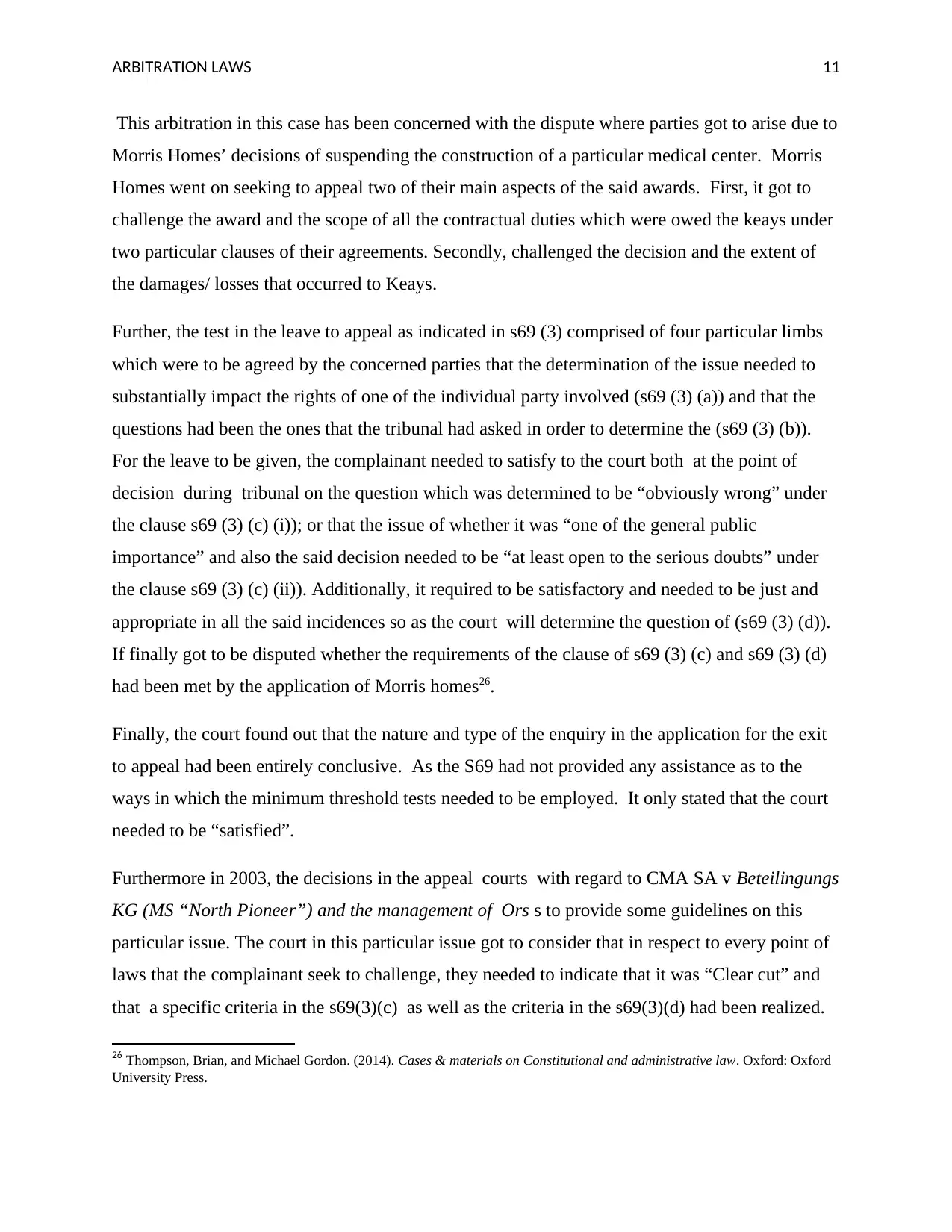
ARBITRATION LAWS 11
This arbitration in this case has been concerned with the dispute where parties got to arise due to
Morris Homes’ decisions of suspending the construction of a particular medical center. Morris
Homes went on seeking to appeal two of their main aspects of the said awards. First, it got to
challenge the award and the scope of all the contractual duties which were owed the keays under
two particular clauses of their agreements. Secondly, challenged the decision and the extent of
the damages/ losses that occurred to Keays.
Further, the test in the leave to appeal as indicated in s69 (3) comprised of four particular limbs
which were to be agreed by the concerned parties that the determination of the issue needed to
substantially impact the rights of one of the individual party involved (s69 (3) (a)) and that the
questions had been the ones that the tribunal had asked in order to determine the (s69 (3) (b)).
For the leave to be given, the complainant needed to satisfy to the court both at the point of
decision during tribunal on the question which was determined to be “obviously wrong” under
the clause s69 (3) (c) (i)); or that the issue of whether it was “one of the general public
importance” and also the said decision needed to be “at least open to the serious doubts” under
the clause s69 (3) (c) (ii)). Additionally, it required to be satisfactory and needed to be just and
appropriate in all the said incidences so as the court will determine the question of (s69 (3) (d)).
If finally got to be disputed whether the requirements of the clause of s69 (3) (c) and s69 (3) (d)
had been met by the application of Morris homes26.
Finally, the court found out that the nature and type of the enquiry in the application for the exit
to appeal had been entirely conclusive. As the S69 had not provided any assistance as to the
ways in which the minimum threshold tests needed to be employed. It only stated that the court
needed to be “satisfied”.
Furthermore in 2003, the decisions in the appeal courts with regard to CMA SA v Beteilingungs
KG (MS “North Pioneer”) and the management of Ors s to provide some guidelines on this
particular issue. The court in this particular issue got to consider that in respect to every point of
laws that the complainant seek to challenge, they needed to indicate that it was “Clear cut” and
that a specific criteria in the s69(3)(c) as well as the criteria in the s69(3)(d) had been realized.
26 Thompson, Brian, and Michael Gordon. (2014). Cases & materials on Constitutional and administrative law. Oxford: Oxford
University Press.
This arbitration in this case has been concerned with the dispute where parties got to arise due to
Morris Homes’ decisions of suspending the construction of a particular medical center. Morris
Homes went on seeking to appeal two of their main aspects of the said awards. First, it got to
challenge the award and the scope of all the contractual duties which were owed the keays under
two particular clauses of their agreements. Secondly, challenged the decision and the extent of
the damages/ losses that occurred to Keays.
Further, the test in the leave to appeal as indicated in s69 (3) comprised of four particular limbs
which were to be agreed by the concerned parties that the determination of the issue needed to
substantially impact the rights of one of the individual party involved (s69 (3) (a)) and that the
questions had been the ones that the tribunal had asked in order to determine the (s69 (3) (b)).
For the leave to be given, the complainant needed to satisfy to the court both at the point of
decision during tribunal on the question which was determined to be “obviously wrong” under
the clause s69 (3) (c) (i)); or that the issue of whether it was “one of the general public
importance” and also the said decision needed to be “at least open to the serious doubts” under
the clause s69 (3) (c) (ii)). Additionally, it required to be satisfactory and needed to be just and
appropriate in all the said incidences so as the court will determine the question of (s69 (3) (d)).
If finally got to be disputed whether the requirements of the clause of s69 (3) (c) and s69 (3) (d)
had been met by the application of Morris homes26.
Finally, the court found out that the nature and type of the enquiry in the application for the exit
to appeal had been entirely conclusive. As the S69 had not provided any assistance as to the
ways in which the minimum threshold tests needed to be employed. It only stated that the court
needed to be “satisfied”.
Furthermore in 2003, the decisions in the appeal courts with regard to CMA SA v Beteilingungs
KG (MS “North Pioneer”) and the management of Ors s to provide some guidelines on this
particular issue. The court in this particular issue got to consider that in respect to every point of
laws that the complainant seek to challenge, they needed to indicate that it was “Clear cut” and
that a specific criteria in the s69(3)(c) as well as the criteria in the s69(3)(d) had been realized.
26 Thompson, Brian, and Michael Gordon. (2014). Cases & materials on Constitutional and administrative law. Oxford: Oxford
University Press.
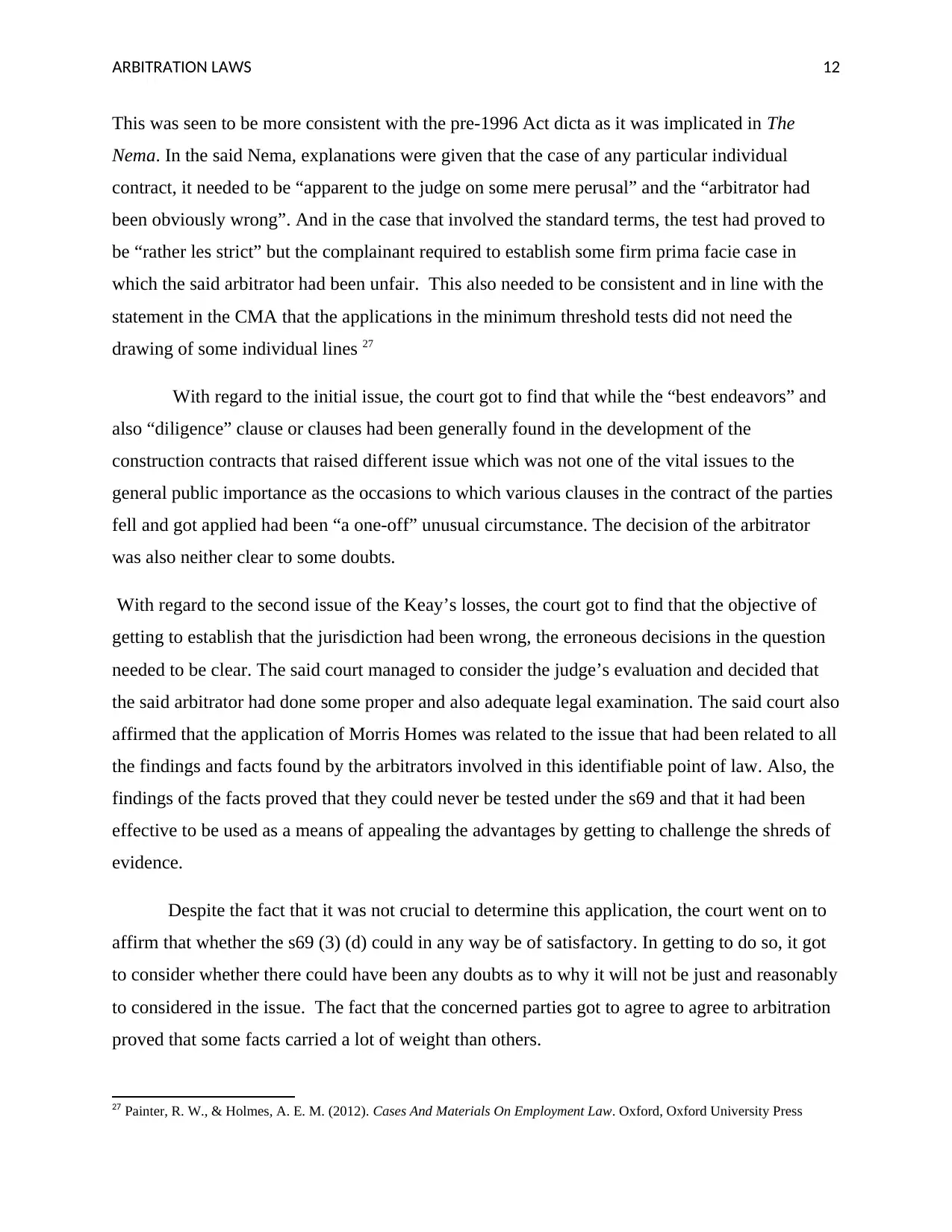
ARBITRATION LAWS 12
This was seen to be more consistent with the pre-1996 Act dicta as it was implicated in The
Nema. In the said Nema, explanations were given that the case of any particular individual
contract, it needed to be “apparent to the judge on some mere perusal” and the “arbitrator had
been obviously wrong”. And in the case that involved the standard terms, the test had proved to
be “rather les strict” but the complainant required to establish some firm prima facie case in
which the said arbitrator had been unfair. This also needed to be consistent and in line with the
statement in the CMA that the applications in the minimum threshold tests did not need the
drawing of some individual lines 27
With regard to the initial issue, the court got to find that while the “best endeavors” and
also “diligence” clause or clauses had been generally found in the development of the
construction contracts that raised different issue which was not one of the vital issues to the
general public importance as the occasions to which various clauses in the contract of the parties
fell and got applied had been “a one-off” unusual circumstance. The decision of the arbitrator
was also neither clear to some doubts.
With regard to the second issue of the Keay’s losses, the court got to find that the objective of
getting to establish that the jurisdiction had been wrong, the erroneous decisions in the question
needed to be clear. The said court managed to consider the judge’s evaluation and decided that
the said arbitrator had done some proper and also adequate legal examination. The said court also
affirmed that the application of Morris Homes was related to the issue that had been related to all
the findings and facts found by the arbitrators involved in this identifiable point of law. Also, the
findings of the facts proved that they could never be tested under the s69 and that it had been
effective to be used as a means of appealing the advantages by getting to challenge the shreds of
evidence.
Despite the fact that it was not crucial to determine this application, the court went on to
affirm that whether the s69 (3) (d) could in any way be of satisfactory. In getting to do so, it got
to consider whether there could have been any doubts as to why it will not be just and reasonably
to considered in the issue. The fact that the concerned parties got to agree to agree to arbitration
proved that some facts carried a lot of weight than others.
27 Painter, R. W., & Holmes, A. E. M. (2012). Cases And Materials On Employment Law. Oxford, Oxford University Press
This was seen to be more consistent with the pre-1996 Act dicta as it was implicated in The
Nema. In the said Nema, explanations were given that the case of any particular individual
contract, it needed to be “apparent to the judge on some mere perusal” and the “arbitrator had
been obviously wrong”. And in the case that involved the standard terms, the test had proved to
be “rather les strict” but the complainant required to establish some firm prima facie case in
which the said arbitrator had been unfair. This also needed to be consistent and in line with the
statement in the CMA that the applications in the minimum threshold tests did not need the
drawing of some individual lines 27
With regard to the initial issue, the court got to find that while the “best endeavors” and
also “diligence” clause or clauses had been generally found in the development of the
construction contracts that raised different issue which was not one of the vital issues to the
general public importance as the occasions to which various clauses in the contract of the parties
fell and got applied had been “a one-off” unusual circumstance. The decision of the arbitrator
was also neither clear to some doubts.
With regard to the second issue of the Keay’s losses, the court got to find that the objective of
getting to establish that the jurisdiction had been wrong, the erroneous decisions in the question
needed to be clear. The said court managed to consider the judge’s evaluation and decided that
the said arbitrator had done some proper and also adequate legal examination. The said court also
affirmed that the application of Morris Homes was related to the issue that had been related to all
the findings and facts found by the arbitrators involved in this identifiable point of law. Also, the
findings of the facts proved that they could never be tested under the s69 and that it had been
effective to be used as a means of appealing the advantages by getting to challenge the shreds of
evidence.
Despite the fact that it was not crucial to determine this application, the court went on to
affirm that whether the s69 (3) (d) could in any way be of satisfactory. In getting to do so, it got
to consider whether there could have been any doubts as to why it will not be just and reasonably
to considered in the issue. The fact that the concerned parties got to agree to agree to arbitration
proved that some facts carried a lot of weight than others.
27 Painter, R. W., & Holmes, A. E. M. (2012). Cases And Materials On Employment Law. Oxford, Oxford University Press
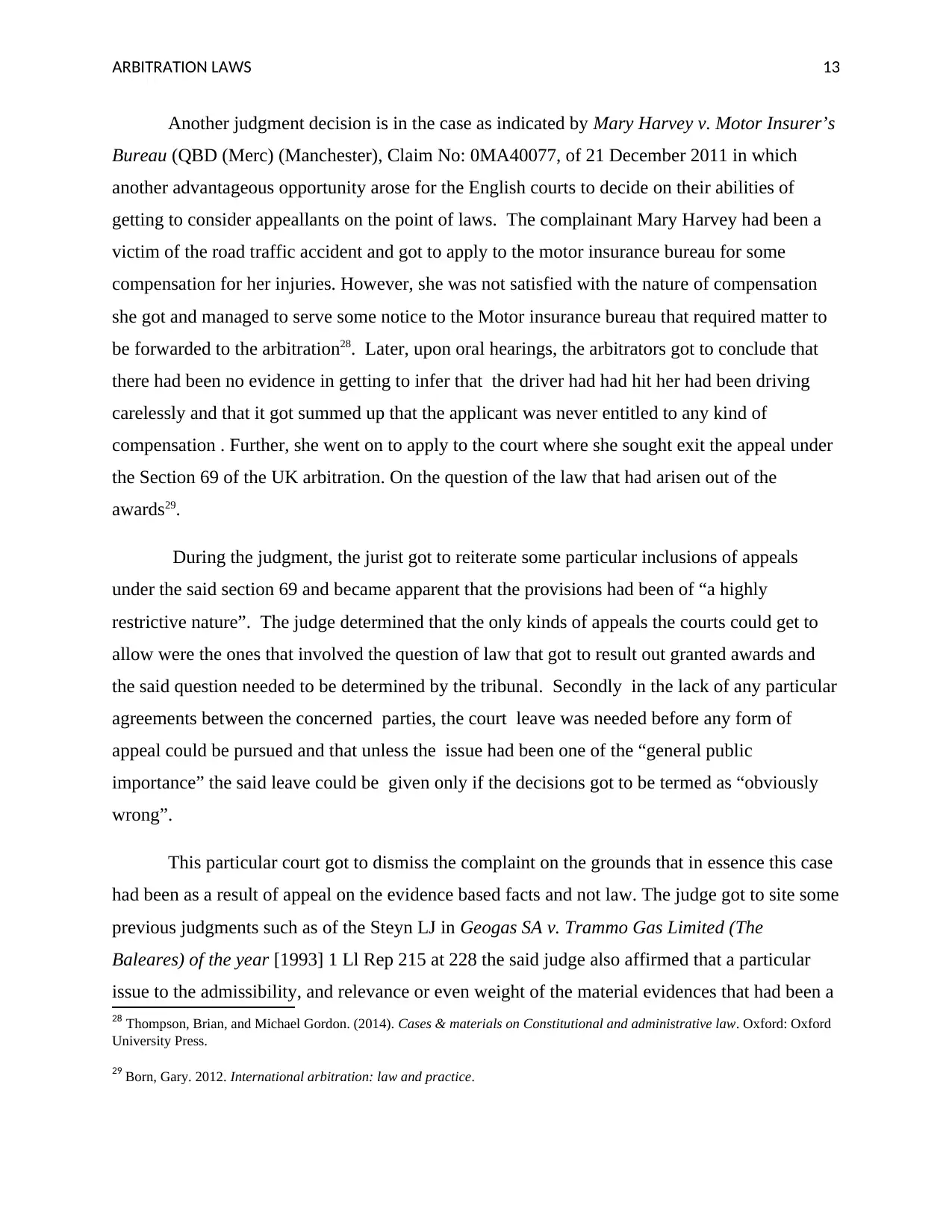
ARBITRATION LAWS 13
Another judgment decision is in the case as indicated by Mary Harvey v. Motor Insurer’s
Bureau (QBD (Merc) (Manchester), Claim No: 0MA40077, of 21 December 2011 in which
another advantageous opportunity arose for the English courts to decide on their abilities of
getting to consider appeallants on the point of laws. The complainant Mary Harvey had been a
victim of the road traffic accident and got to apply to the motor insurance bureau for some
compensation for her injuries. However, she was not satisfied with the nature of compensation
she got and managed to serve some notice to the Motor insurance bureau that required matter to
be forwarded to the arbitration28. Later, upon oral hearings, the arbitrators got to conclude that
there had been no evidence in getting to infer that the driver had had hit her had been driving
carelessly and that it got summed up that the applicant was never entitled to any kind of
compensation . Further, she went on to apply to the court where she sought exit the appeal under
the Section 69 of the UK arbitration. On the question of the law that had arisen out of the
awards29.
During the judgment, the jurist got to reiterate some particular inclusions of appeals
under the said section 69 and became apparent that the provisions had been of “a highly
restrictive nature”. The judge determined that the only kinds of appeals the courts could get to
allow were the ones that involved the question of law that got to result out granted awards and
the said question needed to be determined by the tribunal. Secondly in the lack of any particular
agreements between the concerned parties, the court leave was needed before any form of
appeal could be pursued and that unless the issue had been one of the “general public
importance” the said leave could be given only if the decisions got to be termed as “obviously
wrong”.
This particular court got to dismiss the complaint on the grounds that in essence this case
had been as a result of appeal on the evidence based facts and not law. The judge got to site some
previous judgments such as of the Steyn LJ in Geogas SA v. Trammo Gas Limited (The
Baleares) of the year [1993] 1 Ll Rep 215 at 228 the said judge also affirmed that a particular
issue to the admissibility, and relevance or even weight of the material evidences that had been a
28 Thompson, Brian, and Michael Gordon. (2014). Cases & materials on Constitutional and administrative law. Oxford: Oxford
University Press.
29 Born, Gary. 2012. International arbitration: law and practice.
Another judgment decision is in the case as indicated by Mary Harvey v. Motor Insurer’s
Bureau (QBD (Merc) (Manchester), Claim No: 0MA40077, of 21 December 2011 in which
another advantageous opportunity arose for the English courts to decide on their abilities of
getting to consider appeallants on the point of laws. The complainant Mary Harvey had been a
victim of the road traffic accident and got to apply to the motor insurance bureau for some
compensation for her injuries. However, she was not satisfied with the nature of compensation
she got and managed to serve some notice to the Motor insurance bureau that required matter to
be forwarded to the arbitration28. Later, upon oral hearings, the arbitrators got to conclude that
there had been no evidence in getting to infer that the driver had had hit her had been driving
carelessly and that it got summed up that the applicant was never entitled to any kind of
compensation . Further, she went on to apply to the court where she sought exit the appeal under
the Section 69 of the UK arbitration. On the question of the law that had arisen out of the
awards29.
During the judgment, the jurist got to reiterate some particular inclusions of appeals
under the said section 69 and became apparent that the provisions had been of “a highly
restrictive nature”. The judge determined that the only kinds of appeals the courts could get to
allow were the ones that involved the question of law that got to result out granted awards and
the said question needed to be determined by the tribunal. Secondly in the lack of any particular
agreements between the concerned parties, the court leave was needed before any form of
appeal could be pursued and that unless the issue had been one of the “general public
importance” the said leave could be given only if the decisions got to be termed as “obviously
wrong”.
This particular court got to dismiss the complaint on the grounds that in essence this case
had been as a result of appeal on the evidence based facts and not law. The judge got to site some
previous judgments such as of the Steyn LJ in Geogas SA v. Trammo Gas Limited (The
Baleares) of the year [1993] 1 Ll Rep 215 at 228 the said judge also affirmed that a particular
issue to the admissibility, and relevance or even weight of the material evidences that had been a
28 Thompson, Brian, and Michael Gordon. (2014). Cases & materials on Constitutional and administrative law. Oxford: Oxford
University Press.
29 Born, Gary. 2012. International arbitration: law and practice.
Paraphrase This Document
Need a fresh take? Get an instant paraphrase of this document with our AI Paraphraser
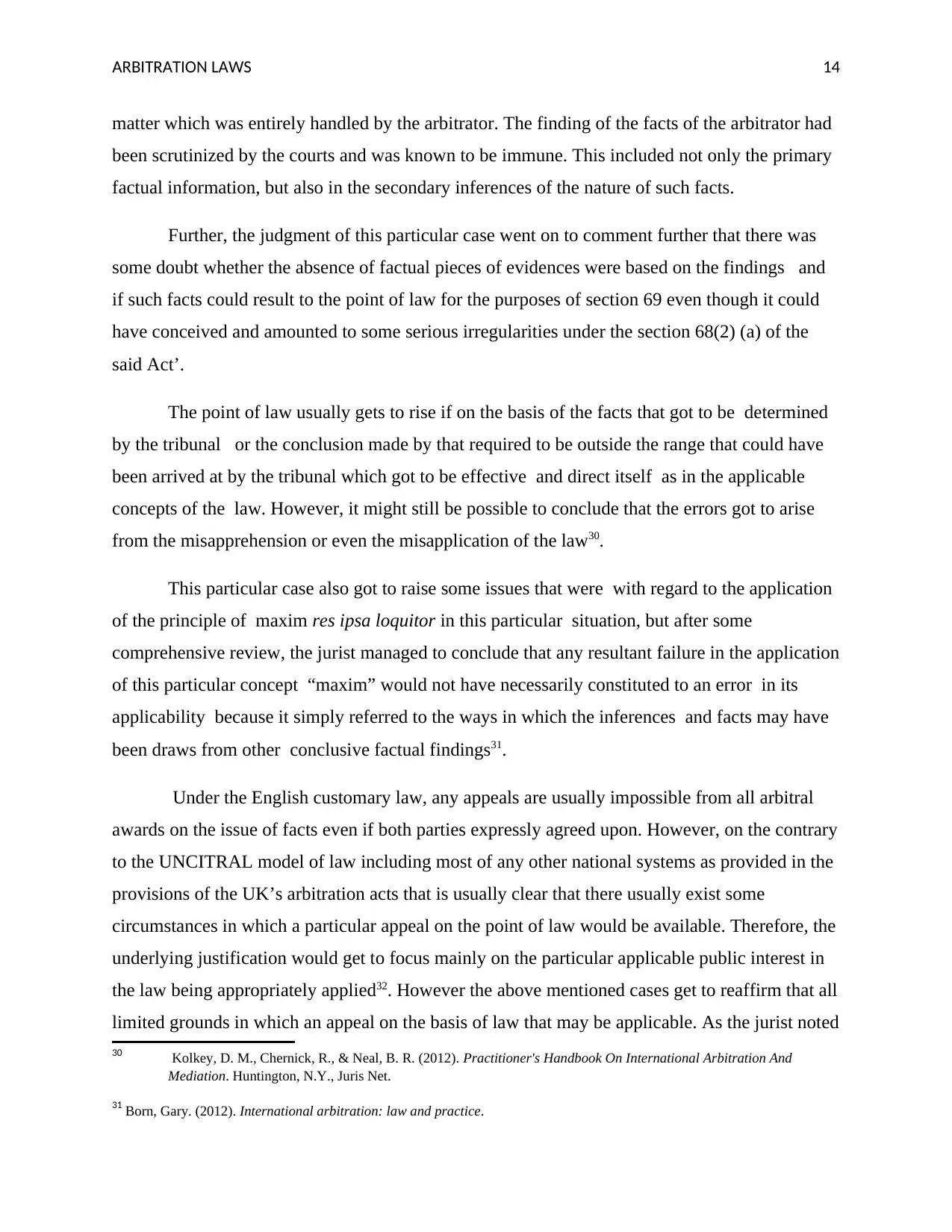
ARBITRATION LAWS 14
matter which was entirely handled by the arbitrator. The finding of the facts of the arbitrator had
been scrutinized by the courts and was known to be immune. This included not only the primary
factual information, but also in the secondary inferences of the nature of such facts.
Further, the judgment of this particular case went on to comment further that there was
some doubt whether the absence of factual pieces of evidences were based on the findings and
if such facts could result to the point of law for the purposes of section 69 even though it could
have conceived and amounted to some serious irregularities under the section 68(2) (a) of the
said Act’.
The point of law usually gets to rise if on the basis of the facts that got to be determined
by the tribunal or the conclusion made by that required to be outside the range that could have
been arrived at by the tribunal which got to be effective and direct itself as in the applicable
concepts of the law. However, it might still be possible to conclude that the errors got to arise
from the misapprehension or even the misapplication of the law30.
This particular case also got to raise some issues that were with regard to the application
of the principle of maxim res ipsa loquitor in this particular situation, but after some
comprehensive review, the jurist managed to conclude that any resultant failure in the application
of this particular concept “maxim” would not have necessarily constituted to an error in its
applicability because it simply referred to the ways in which the inferences and facts may have
been draws from other conclusive factual findings31.
Under the English customary law, any appeals are usually impossible from all arbitral
awards on the issue of facts even if both parties expressly agreed upon. However, on the contrary
to the UNCITRAL model of law including most of any other national systems as provided in the
provisions of the UK’s arbitration acts that is usually clear that there usually exist some
circumstances in which a particular appeal on the point of law would be available. Therefore, the
underlying justification would get to focus mainly on the particular applicable public interest in
the law being appropriately applied32. However the above mentioned cases get to reaffirm that all
limited grounds in which an appeal on the basis of law that may be applicable. As the jurist noted
30 Kolkey, D. M., Chernick, R., & Neal, B. R. (2012). Practitioner's Handbook On International Arbitration And
Mediation. Huntington, N.Y., Juris Net.
31 Born, Gary. (2012). International arbitration: law and practice.
matter which was entirely handled by the arbitrator. The finding of the facts of the arbitrator had
been scrutinized by the courts and was known to be immune. This included not only the primary
factual information, but also in the secondary inferences of the nature of such facts.
Further, the judgment of this particular case went on to comment further that there was
some doubt whether the absence of factual pieces of evidences were based on the findings and
if such facts could result to the point of law for the purposes of section 69 even though it could
have conceived and amounted to some serious irregularities under the section 68(2) (a) of the
said Act’.
The point of law usually gets to rise if on the basis of the facts that got to be determined
by the tribunal or the conclusion made by that required to be outside the range that could have
been arrived at by the tribunal which got to be effective and direct itself as in the applicable
concepts of the law. However, it might still be possible to conclude that the errors got to arise
from the misapprehension or even the misapplication of the law30.
This particular case also got to raise some issues that were with regard to the application
of the principle of maxim res ipsa loquitor in this particular situation, but after some
comprehensive review, the jurist managed to conclude that any resultant failure in the application
of this particular concept “maxim” would not have necessarily constituted to an error in its
applicability because it simply referred to the ways in which the inferences and facts may have
been draws from other conclusive factual findings31.
Under the English customary law, any appeals are usually impossible from all arbitral
awards on the issue of facts even if both parties expressly agreed upon. However, on the contrary
to the UNCITRAL model of law including most of any other national systems as provided in the
provisions of the UK’s arbitration acts that is usually clear that there usually exist some
circumstances in which a particular appeal on the point of law would be available. Therefore, the
underlying justification would get to focus mainly on the particular applicable public interest in
the law being appropriately applied32. However the above mentioned cases get to reaffirm that all
limited grounds in which an appeal on the basis of law that may be applicable. As the jurist noted
30 Kolkey, D. M., Chernick, R., & Neal, B. R. (2012). Practitioner's Handbook On International Arbitration And
Mediation. Huntington, N.Y., Juris Net.
31 Born, Gary. (2012). International arbitration: law and practice.
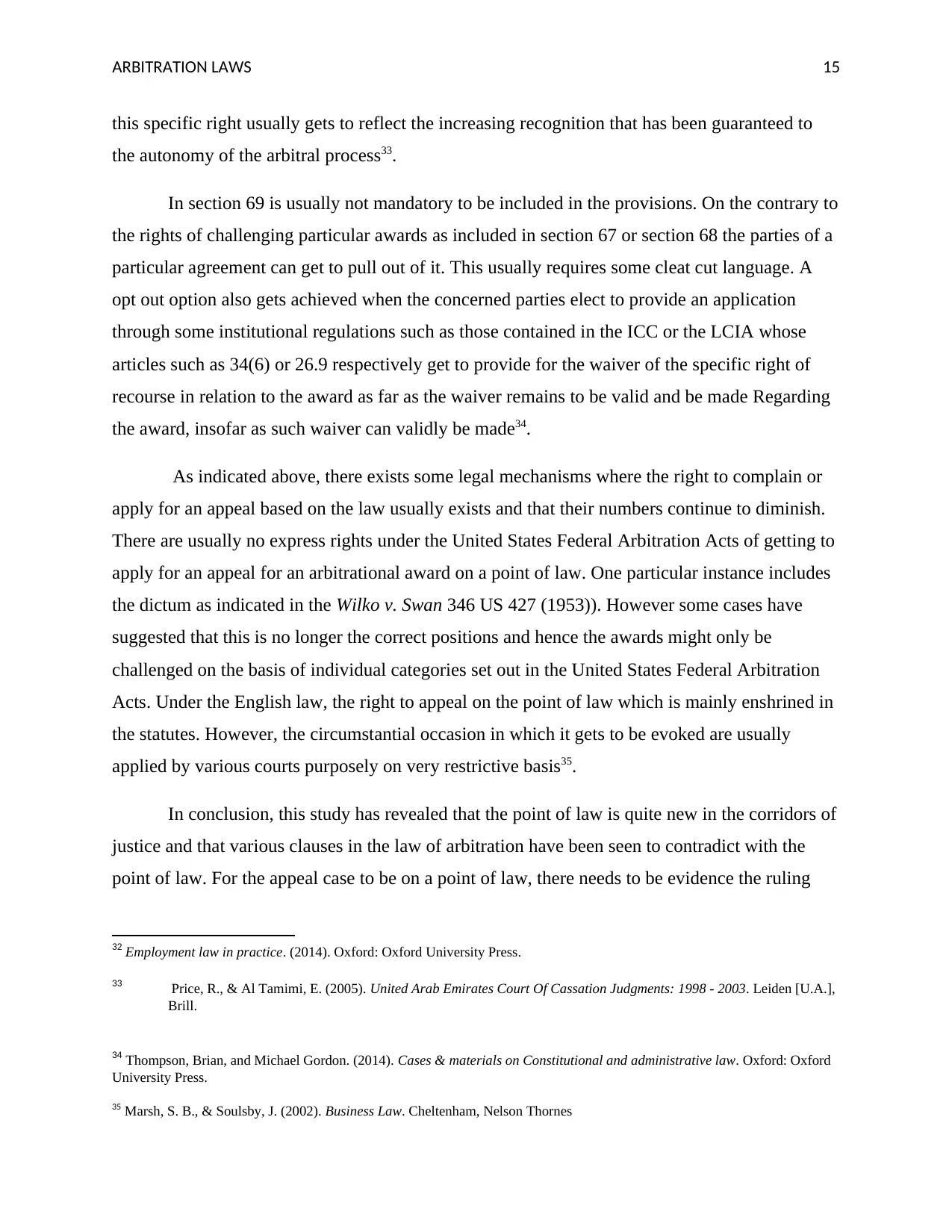
ARBITRATION LAWS 15
this specific right usually gets to reflect the increasing recognition that has been guaranteed to
the autonomy of the arbitral process33.
In section 69 is usually not mandatory to be included in the provisions. On the contrary to
the rights of challenging particular awards as included in section 67 or section 68 the parties of a
particular agreement can get to pull out of it. This usually requires some cleat cut language. A
opt out option also gets achieved when the concerned parties elect to provide an application
through some institutional regulations such as those contained in the ICC or the LCIA whose
articles such as 34(6) or 26.9 respectively get to provide for the waiver of the specific right of
recourse in relation to the award as far as the waiver remains to be valid and be made Regarding
the award, insofar as such waiver can validly be made34.
As indicated above, there exists some legal mechanisms where the right to complain or
apply for an appeal based on the law usually exists and that their numbers continue to diminish.
There are usually no express rights under the United States Federal Arbitration Acts of getting to
apply for an appeal for an arbitrational award on a point of law. One particular instance includes
the dictum as indicated in the Wilko v. Swan 346 US 427 (1953)). However some cases have
suggested that this is no longer the correct positions and hence the awards might only be
challenged on the basis of individual categories set out in the United States Federal Arbitration
Acts. Under the English law, the right to appeal on the point of law which is mainly enshrined in
the statutes. However, the circumstantial occasion in which it gets to be evoked are usually
applied by various courts purposely on very restrictive basis35.
In conclusion, this study has revealed that the point of law is quite new in the corridors of
justice and that various clauses in the law of arbitration have been seen to contradict with the
point of law. For the appeal case to be on a point of law, there needs to be evidence the ruling
32 Employment law in practice. (2014). Oxford: Oxford University Press.
33 Price, R., & Al Tamimi, E. (2005). United Arab Emirates Court Of Cassation Judgments: 1998 - 2003. Leiden [U.A.],
Brill.
34 Thompson, Brian, and Michael Gordon. (2014). Cases & materials on Constitutional and administrative law. Oxford: Oxford
University Press.
35 Marsh, S. B., & Soulsby, J. (2002). Business Law. Cheltenham, Nelson Thornes
this specific right usually gets to reflect the increasing recognition that has been guaranteed to
the autonomy of the arbitral process33.
In section 69 is usually not mandatory to be included in the provisions. On the contrary to
the rights of challenging particular awards as included in section 67 or section 68 the parties of a
particular agreement can get to pull out of it. This usually requires some cleat cut language. A
opt out option also gets achieved when the concerned parties elect to provide an application
through some institutional regulations such as those contained in the ICC or the LCIA whose
articles such as 34(6) or 26.9 respectively get to provide for the waiver of the specific right of
recourse in relation to the award as far as the waiver remains to be valid and be made Regarding
the award, insofar as such waiver can validly be made34.
As indicated above, there exists some legal mechanisms where the right to complain or
apply for an appeal based on the law usually exists and that their numbers continue to diminish.
There are usually no express rights under the United States Federal Arbitration Acts of getting to
apply for an appeal for an arbitrational award on a point of law. One particular instance includes
the dictum as indicated in the Wilko v. Swan 346 US 427 (1953)). However some cases have
suggested that this is no longer the correct positions and hence the awards might only be
challenged on the basis of individual categories set out in the United States Federal Arbitration
Acts. Under the English law, the right to appeal on the point of law which is mainly enshrined in
the statutes. However, the circumstantial occasion in which it gets to be evoked are usually
applied by various courts purposely on very restrictive basis35.
In conclusion, this study has revealed that the point of law is quite new in the corridors of
justice and that various clauses in the law of arbitration have been seen to contradict with the
point of law. For the appeal case to be on a point of law, there needs to be evidence the ruling
32 Employment law in practice. (2014). Oxford: Oxford University Press.
33 Price, R., & Al Tamimi, E. (2005). United Arab Emirates Court Of Cassation Judgments: 1998 - 2003. Leiden [U.A.],
Brill.
34 Thompson, Brian, and Michael Gordon. (2014). Cases & materials on Constitutional and administrative law. Oxford: Oxford
University Press.
35 Marsh, S. B., & Soulsby, J. (2002). Business Law. Cheltenham, Nelson Thornes
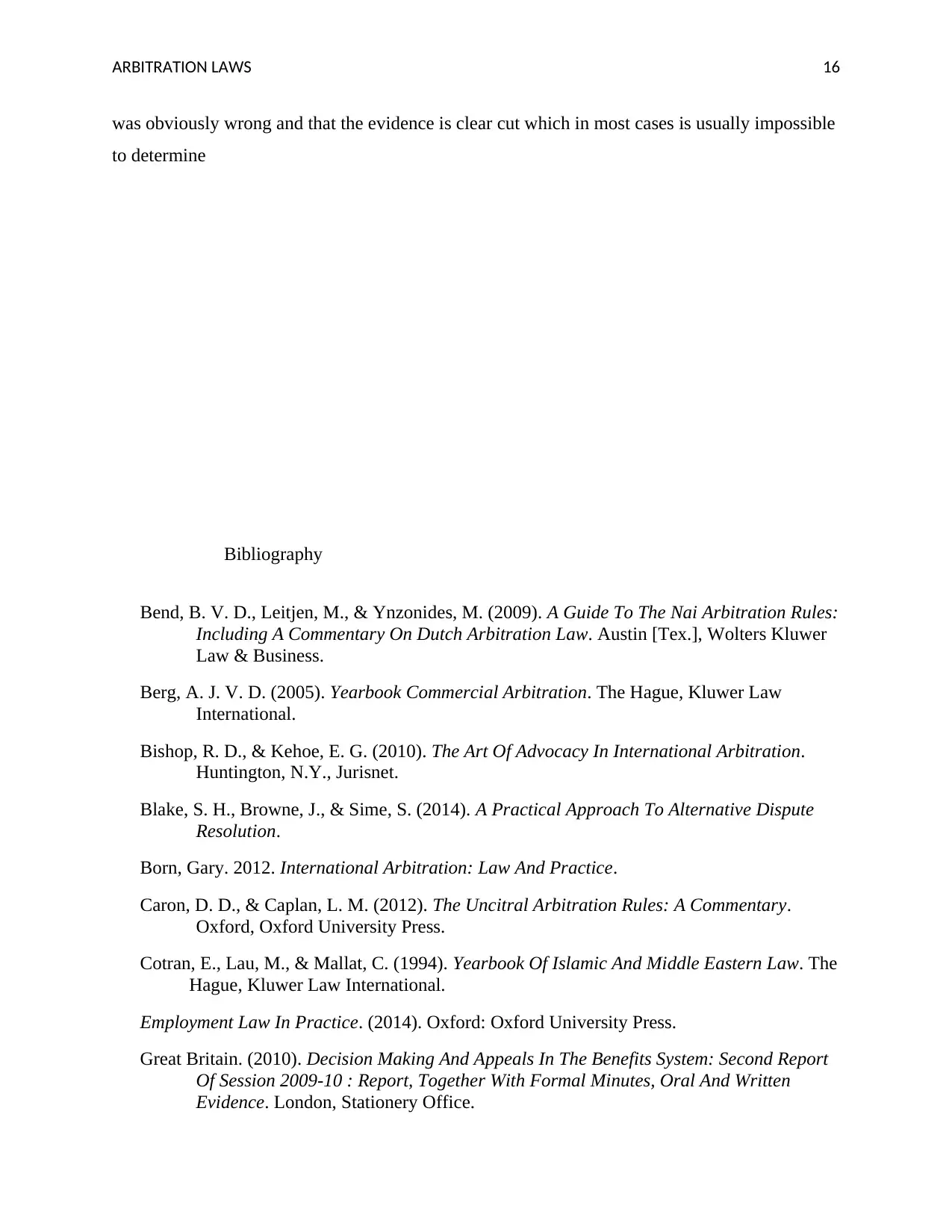
ARBITRATION LAWS 16
was obviously wrong and that the evidence is clear cut which in most cases is usually impossible
to determine
Bibliography
Bend, B. V. D., Leitjen, M., & Ynzonides, M. (2009). A Guide To The Nai Arbitration Rules:
Including A Commentary On Dutch Arbitration Law. Austin [Tex.], Wolters Kluwer
Law & Business.
Berg, A. J. V. D. (2005). Yearbook Commercial Arbitration. The Hague, Kluwer Law
International.
Bishop, R. D., & Kehoe, E. G. (2010). The Art Of Advocacy In International Arbitration.
Huntington, N.Y., Jurisnet.
Blake, S. H., Browne, J., & Sime, S. (2014). A Practical Approach To Alternative Dispute
Resolution.
Born, Gary. 2012. International Arbitration: Law And Practice.
Caron, D. D., & Caplan, L. M. (2012). The Uncitral Arbitration Rules: A Commentary.
Oxford, Oxford University Press.
Cotran, E., Lau, M., & Mallat, C. (1994). Yearbook Of Islamic And Middle Eastern Law. The
Hague, Kluwer Law International.
Employment Law In Practice. (2014). Oxford: Oxford University Press.
Great Britain. (2010). Decision Making And Appeals In The Benefits System: Second Report
Of Session 2009-10 : Report, Together With Formal Minutes, Oral And Written
Evidence. London, Stationery Office.
was obviously wrong and that the evidence is clear cut which in most cases is usually impossible
to determine
Bibliography
Bend, B. V. D., Leitjen, M., & Ynzonides, M. (2009). A Guide To The Nai Arbitration Rules:
Including A Commentary On Dutch Arbitration Law. Austin [Tex.], Wolters Kluwer
Law & Business.
Berg, A. J. V. D. (2005). Yearbook Commercial Arbitration. The Hague, Kluwer Law
International.
Bishop, R. D., & Kehoe, E. G. (2010). The Art Of Advocacy In International Arbitration.
Huntington, N.Y., Jurisnet.
Blake, S. H., Browne, J., & Sime, S. (2014). A Practical Approach To Alternative Dispute
Resolution.
Born, Gary. 2012. International Arbitration: Law And Practice.
Caron, D. D., & Caplan, L. M. (2012). The Uncitral Arbitration Rules: A Commentary.
Oxford, Oxford University Press.
Cotran, E., Lau, M., & Mallat, C. (1994). Yearbook Of Islamic And Middle Eastern Law. The
Hague, Kluwer Law International.
Employment Law In Practice. (2014). Oxford: Oxford University Press.
Great Britain. (2010). Decision Making And Appeals In The Benefits System: Second Report
Of Session 2009-10 : Report, Together With Formal Minutes, Oral And Written
Evidence. London, Stationery Office.
Secure Best Marks with AI Grader
Need help grading? Try our AI Grader for instant feedback on your assignments.
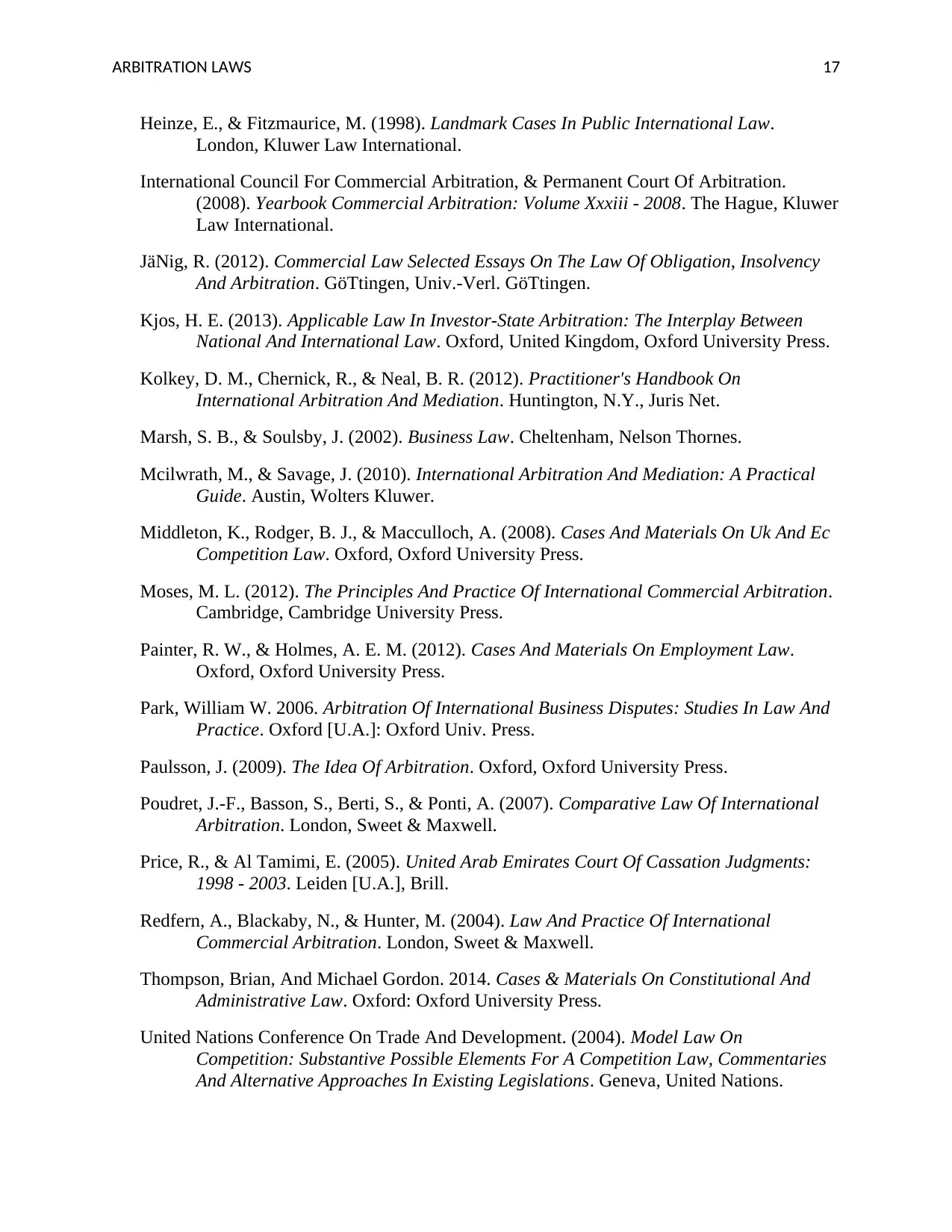
ARBITRATION LAWS 17
Heinze, E., & Fitzmaurice, M. (1998). Landmark Cases In Public International Law.
London, Kluwer Law International.
International Council For Commercial Arbitration, & Permanent Court Of Arbitration.
(2008). Yearbook Commercial Arbitration: Volume Xxxiii - 2008. The Hague, Kluwer
Law International.
JäNig, R. (2012). Commercial Law Selected Essays On The Law Of Obligation, Insolvency
And Arbitration. GöTtingen, Univ.-Verl. GöTtingen.
Kjos, H. E. (2013). Applicable Law In Investor-State Arbitration: The Interplay Between
National And International Law. Oxford, United Kingdom, Oxford University Press.
Kolkey, D. M., Chernick, R., & Neal, B. R. (2012). Practitioner's Handbook On
International Arbitration And Mediation. Huntington, N.Y., Juris Net.
Marsh, S. B., & Soulsby, J. (2002). Business Law. Cheltenham, Nelson Thornes.
Mcilwrath, M., & Savage, J. (2010). International Arbitration And Mediation: A Practical
Guide. Austin, Wolters Kluwer.
Middleton, K., Rodger, B. J., & Macculloch, A. (2008). Cases And Materials On Uk And Ec
Competition Law. Oxford, Oxford University Press.
Moses, M. L. (2012). The Principles And Practice Of International Commercial Arbitration.
Cambridge, Cambridge University Press.
Painter, R. W., & Holmes, A. E. M. (2012). Cases And Materials On Employment Law.
Oxford, Oxford University Press.
Park, William W. 2006. Arbitration Of International Business Disputes: Studies In Law And
Practice. Oxford [U.A.]: Oxford Univ. Press.
Paulsson, J. (2009). The Idea Of Arbitration. Oxford, Oxford University Press.
Poudret, J.-F., Basson, S., Berti, S., & Ponti, A. (2007). Comparative Law Of International
Arbitration. London, Sweet & Maxwell.
Price, R., & Al Tamimi, E. (2005). United Arab Emirates Court Of Cassation Judgments:
1998 - 2003. Leiden [U.A.], Brill.
Redfern, A., Blackaby, N., & Hunter, M. (2004). Law And Practice Of International
Commercial Arbitration. London, Sweet & Maxwell.
Thompson, Brian, And Michael Gordon. 2014. Cases & Materials On Constitutional And
Administrative Law. Oxford: Oxford University Press.
United Nations Conference On Trade And Development. (2004). Model Law On
Competition: Substantive Possible Elements For A Competition Law, Commentaries
And Alternative Approaches In Existing Legislations. Geneva, United Nations.
Heinze, E., & Fitzmaurice, M. (1998). Landmark Cases In Public International Law.
London, Kluwer Law International.
International Council For Commercial Arbitration, & Permanent Court Of Arbitration.
(2008). Yearbook Commercial Arbitration: Volume Xxxiii - 2008. The Hague, Kluwer
Law International.
JäNig, R. (2012). Commercial Law Selected Essays On The Law Of Obligation, Insolvency
And Arbitration. GöTtingen, Univ.-Verl. GöTtingen.
Kjos, H. E. (2013). Applicable Law In Investor-State Arbitration: The Interplay Between
National And International Law. Oxford, United Kingdom, Oxford University Press.
Kolkey, D. M., Chernick, R., & Neal, B. R. (2012). Practitioner's Handbook On
International Arbitration And Mediation. Huntington, N.Y., Juris Net.
Marsh, S. B., & Soulsby, J. (2002). Business Law. Cheltenham, Nelson Thornes.
Mcilwrath, M., & Savage, J. (2010). International Arbitration And Mediation: A Practical
Guide. Austin, Wolters Kluwer.
Middleton, K., Rodger, B. J., & Macculloch, A. (2008). Cases And Materials On Uk And Ec
Competition Law. Oxford, Oxford University Press.
Moses, M. L. (2012). The Principles And Practice Of International Commercial Arbitration.
Cambridge, Cambridge University Press.
Painter, R. W., & Holmes, A. E. M. (2012). Cases And Materials On Employment Law.
Oxford, Oxford University Press.
Park, William W. 2006. Arbitration Of International Business Disputes: Studies In Law And
Practice. Oxford [U.A.]: Oxford Univ. Press.
Paulsson, J. (2009). The Idea Of Arbitration. Oxford, Oxford University Press.
Poudret, J.-F., Basson, S., Berti, S., & Ponti, A. (2007). Comparative Law Of International
Arbitration. London, Sweet & Maxwell.
Price, R., & Al Tamimi, E. (2005). United Arab Emirates Court Of Cassation Judgments:
1998 - 2003. Leiden [U.A.], Brill.
Redfern, A., Blackaby, N., & Hunter, M. (2004). Law And Practice Of International
Commercial Arbitration. London, Sweet & Maxwell.
Thompson, Brian, And Michael Gordon. 2014. Cases & Materials On Constitutional And
Administrative Law. Oxford: Oxford University Press.
United Nations Conference On Trade And Development. (2004). Model Law On
Competition: Substantive Possible Elements For A Competition Law, Commentaries
And Alternative Approaches In Existing Legislations. Geneva, United Nations.

ARBITRATION LAWS 18
1 out of 18
Related Documents
Your All-in-One AI-Powered Toolkit for Academic Success.
+13062052269
info@desklib.com
Available 24*7 on WhatsApp / Email
![[object Object]](/_next/static/media/star-bottom.7253800d.svg)
Unlock your academic potential
© 2024 | Zucol Services PVT LTD | All rights reserved.





